
Apr 23, 2024 | IT, Tips
With vacancies above pre-pandemic levels and unemployment at an almost record low, it’s important to choose your IT recruitment partner carefully. You need to partner with someone who knows the market. Someone who knows how to find excellent candidates in times of a skills shortage. Not all recruiters are the same! Yes, there’s some basic principles we all stick to, but that’s not enough right now!
Here’s just some of the reasons why our clients choose us as their IT Recruitment Partner. We can…
…help you budget
Wouldn’t you rather work with an IT recruitment partner who has the market insight to ensure you attract the best candidates? And that you have the right amount in your budget to do so? We don’t just recruit for our clients, we share information on latest salaries, candidate availability and more! Each month, we produce a full IT salary guide showing the latest salaries and day rates for the most popular IT roles. We share the monthly increases and decreases for your area so you can see exactly what’s happening in the market.
Our salary guides can help you when scoping costs and budgets for new IT Projects, expanding a team, or comparing salaries in a competitive marketplace to ensure your remuneration is aligned accordingly.
We currently produce salary guides for UK, London, Yorkshire and the North West. But we can produce bespoke reports on request. So, if you want to know if you are allocating the right budget before you start the recruitment process, get in touch with us today.
…help you plan
We know that recruitment is something that gets added to an already pretty impressive to do list. So you need an IT recruitment partner who you can trust to manage the whole process for you.
When we register a vacancy order from you, we make sure that we understand your unique circumstances, your challenges, your organisation, your team, your culture and what the future looks like. Then you can leave it to the experts. When we work on a role, we do so on a project basis. Your dedicated resourcer will agree a campaign start and end date with you meaning that you will receive a full, qualified shortlist of candidates. We find that our clients prefer to work in this way rather than being drip fed CVs throughout the campaign. It’s a much more effective way of planning your time and also keeping the candidates engaged.
So not only do we ensure shortlists of qualified candidates are delivered in a timely manner, but we can also arrange interviews are to suit your agenda. And once you’ve chosen your perfect candidate we can look after everything from delivering the offer and confirming acceptance to negotiating start dates and helping candidates with resignations.

…be the IT recruitment partner that gives you peace of mind
We understand that there’s always a risk when it comes to recruiting new members of your team. And that’s why we have an industry leading guarantee to help give you peace of mind. Whilst we, (and you) do everything we can to help prevent any issues, sometimes things just don’t work out. Our guarantee means that should the worst happen, we’ve got you covered. We will replace your candidate with no charge up to 3 months after they start.
With the market as it is right now, working with an IT recruitment partner that can not only find the best candidates, but also give you peace of mind is imperative.
Ask our team for more information on our guarantee today.
…help with writing job descriptions
We know what you need on your job description to help attract the best candidates. But don’t worry, we won’t just leave you to get on with it if you need help.
Not only should each employee have a clear job description as part of the HR process, crafting the perfect job description can actually help you to secure the best talent. But it’s not just that! A poor job description, or none at all could actually be preventing you from hiring the best IT talent.
Often, candidates will ask to see a job description before they confirm that their CV can be sent. We help make sure that you’re presenting the best version of your company and your job to keep their interest.
…make things simple with automatic billing for contractors
Hiring a contractor shouldn’t mean lots of additional admin. We keep things simple with automatic billing. All you need to do is simply authorise a weekly timesheet and we’ll do the rest. We’ll organise payment to the contractor and ensure all the necessary legislation is adhered to.
Our self billing agreements with contractors makes it easy for them too. With invoices and payment automatically created from timesheet approval, it speeds up the payment process, reducing administration for everyone.
…use our years of experience to find the best candidates
Did you know that Langley James has been helping companies to recruit someone worth recruiting for over 20 years? We take our role seriously and are ISO accredited which ensures quality in our procedures. Our years of experience (some of our recruiters have over 25 years’ experience!), means that we know our market!
Since opening in 1999, we have been consistently improving our processes to make sure that we provide the very best service possible. Here’s just some of the ways we’ve done this –
- We’ve been building our database for over 20 years. This means that we know a lot of people who may not necessarily be available on the open market. These are candidates that trust us with their IT career and know that we will approach them with any suitable roles
- We use a large selection of job boards. Our investment in job boards is one of the largest in the market. We are always monitoring the effectiveness of the boards that we use and are constantly testing new boards. We use both general and IT specific boards to help ensure the greatest reach for your vacancy.
- We’re highly active on social media. And we don’t just use LinkedIn like most other agencies do. We also know how to get the best from Facebook and Twitter too. We were one of the first agencies to utilise social media to find you the best candidates – that a look for yourself – @ITRecruitment
Choose Langley James as your IT recruitment partner today.

Apr 23, 2024 | IT, Tips
We are in the middle of a long and sustained talent crisis. Candidate availability is decreasing by the day, and job vacancies continue to rise. Albeit at a slightly slower rate over the last few months. But the success of your business depends on your team. The people you hire have a direct impact on your success. So, when it comes to your next vacancy, you may be asking which is best for you – recruitment agency vs direct hiring.
We’ve asked our expert consultants to share their insight on the pros and cons of both to help you make that all important decision.
Agency vs Direct
We’ve written at length about the benefits of working with a specialised recruitment agency, but let’s compare some key areas when it comes to recruitment agency vs direct hiring.
Writing adverts
This may sound like a simple process, but don’t be fooled. Yes, it’s true that we can all write an advert stating the responsibilities and requirements. However, in the current market, that is not enough! Candidates are less likely to apply for a job with a list of demands. They want the story, the feeling, a sense of what you stand for. They want the benefits, the future opportunities, and a sense of being part of something important in the world.
If you don’t have experience of this, you are likely to find that your advert will be a bit of a ‘damp squid’ and won’t attract the people you need to make your business a continued success. Agencies are writing adverts day in, day out. They know what it takes to get the best response.
Access to candidates
A recruitment agency will have access to many more candidates than you will if you recruit direct. Not only do they have a large database of experienced candidates, but they are also able to advertise in lots of different ways. This means that you don’t just get the best people who are currently on the market. A recruiter will also headhunt suitable candidates for you using a combination of technology and their personal network. This means that your shortlist should be the very best candidates for the job.
Direct hiring tends to be focused on adverts, website pages and the odd social media post. The reach is not as great as that of a recruiter. With direct hiring, you are unlikely to have the tools you need to get your advert out as far as it needs to go. Lots of companies use their own employees to recommend candidates. Whilst this is great in some instances, it can have an impact on your diversity. Something to bear in mind with any employee referral scheme.
Sifting through CV’s – Recruitment Agency vs Direct Hiring
Depending on how much time you have, it could be a benefit for you to read through all the applications you receive if you do decide direct hiring is for you. The advantages are that you see not just shortlisted candidates, but every single response. This will give you a real insight into the market (if your job advert is great!) and may give you insight on what you need to change to attract the best.
You’ve also got to have the technical knowledge when it comes to IT. You may be looking for experience in a particular piece of tech. And unless you’re aware of other technologies where skills can easily transfer, you could be missing out on a great candidate!
Either way, be prepared to spend lots of time looking at unsuitable CVs as the pay-off for direct hiring. However, if you don’t have the extra time needed to go through the process, using a recruitment agency van be a valuable way of finding new talent for your business. Shortlisting is completed on your behalf, and you only have to choose who to interview from a shortlist of CVs.

Employer branding
You’ve probably heard more and more people start to talk about employer branding. It’s a vital part of the direct hiring process. When was the last time you reviewed yours? What does your Glassdoor say about you? How are your Google reviews? There are many things to consider when recruiting direct when it comes to how you are perceived in the market.
However, we know that there are some really great companies to work for our there who don’t have any employer brand at all. And if this is you then using a recruitment agency is the best idea. Recruitment consultants are highly skilled at attracting candidates to opportunities. They sell the opportunity first and the company a very close second. This gives the added benefit that any questions candidates have about your values, culture, and more, can be answered directly. So, whether you have a strong employer brand or not, you’ll still get the best candidates using a recruitment agency.
The same can be said for candidate experience too. If you already have a robust recruitment communication process, great, direct hiring could be for you. But remember that candidates expect a response within 24 hours of their application now. They expect to be kept up to date at every stage in the process. Do you have the time and organisation to do that effectively?
Cost
There’s a general misconception in the market that using recruitment agencies can be costly. But this is usually when it’s looked at in isolation and not compared to direct hiring. If you wanted to do the same work as a recruiter does, it could end up costing you considerably more. And this cost increases if you’re not regularly recruiting. Recruitment agencies spend hundreds of thousands of pounds behind the scenes to make sure that they are providing the best service and the best candidates.
You’d be amazed how much it costs to just advertise a job on one job board, let along over 30! Access to CV databases is also at a great cost, and let’s not get started on the costs associated with LinkedIn! Then there’s the time spent searching out the best candidates. At Langley James, we allocate at least 3 full days just to shortlist candidates for you. And in the current market, this can take longer too.
But there’s one huge benefit when it comes to cost. Recruitment agencies will not charge you a penny until they have been successful, regardless of the time spent on the role. This is something you can’t do with direct hiring. You take a financial risk every time you recruit direct – there are no guarantees of success.
Recruitment Agency Vs Direct Hiring – Summary
If you have lots of time on your hands, and an ‘easy to fill’ role then direct hiring will probably work for you. But, if you have a harder to fill role but you still want the very best candidates, without having to invest your own time, you need the help of a recruitment agency.
About Langley James
We have been helping companies to attract and retain the very best IT talent since 1999. But we don’t just simply find the best candidates. We can advise you on the current jobs market conditions. Share data on average IT salaries. Talk to you about the benefits that candidates are looking for. In fact, we do everything we can to help ensure that you get the very best people for your team. Get in touch with our team to find out how we can help you to recruit the best!

Apr 23, 2024 | Hiring Resources, IT, News
Do you need to recruit IT staff right now? Finding the perfect IT professional to join your company is difficult. However, you still aim to source and recruit the best of the best who will fit both your role and company culture. Like everyone, you’re no doubt already busy/ Recruiting is always an extra thing to add to your long to do list. You’re battling to turn around an attractive job description, market your role, source ideal candidates, search through piles of online applications and conduct interviews. It’s a very time-consuming and lengthy process. But with time really of the essence in this market, it’s not the best way forward.
The market is moving so quickly, even if you do see a couple of remarkable candidates, you rush to contact them only to find out they are no longer available. Who’s snapped them up? One of your competitors maybe? Maybe it’s a competitor who has utilised a great recruitment agency like us?
If you feel like you’re losing the IT recruitment battle and you’re looking to boost your efforts, working with an IT agency is a strategy to consider.
The benefits of working with a recruitment agency to recruit IT staff
Here are just a few reasons why you should be working with an IT recruiter to source your next IT expert:
Experience
IT recruitment is our passion. We understand how important each candidate touchpoint is, along with strategies to source, engage with and convert talented applicants into keen candidates. This experience is invaluable in the current market. You need to partner with an agency who knows what works and how to get the best results for you.
A good recruiter will have a detailed understanding the market and their area of specialism. A recruiter who specialises in IT will have the industry knowledge to find you the perfect candidate. They understand the skillset you need, and some will even have hands-on experience themselves. Therefore, in a skills short market, if you’re struggling to find exactly what you need, a specialist IT recruiter may be able to make suggestions on how to widen your search.

Connections are invaluable to recruit IT staff
And it’s not just the experience to understand who you are looking for, and how to find them. Recruitment agencies will have a large pool of candidates. This is what sets us apart! Not only will a recruiter have an excellent database of candidates that they have been building over a number of years, but they will also have a strong network they can tap into. It’s amazing how many candidates get the job of their dreams for a recommendation from a colleague. A recruiter knows how to utilise their connections to get the best results for you.
At Langley James, we’ve been recruiting IT staff for 25 years now. Our network of candidates is one of the strongest in the market. This is what you really need in the current climate – a recruiter with a very strong database.
An IT recruiters’ mission is to support you in finding the ideal candidate. However, they also support their pool of talent to find the ideal role and workplace. It’s the perfect combination.
Time
Wouldn’t it be great to be able to hand over your IT recruitment needs to someone you can really trust? Someone who will get the job done and secure the very best candidate for you with minimal fuss. Allowing you to focus on what you’re good at – your job. Recruiters live and breathe recruitment. We know how to get results, even in the current market. A recruiter will have a plethora of tools at their fingertips that helps make your recruitment process more efficient. We know how to attract the right candidates. We can even make contact with people who may not actively be looking for a job but are likely to be excited by your opportunity.
But saving you time when you recruit IT staff isn’t the end of the story. Better still, a recruiter can even save you money by ensuring they source candidates who will become long-term, loyal employees. We do this by matching not just skills, but ambitions, values, and culture fit. This reduces the likelihood of starting the recruitment process again a few months later!
Finding the right recruitment agency
Not all recruitment agencies are the same. Therefore, it’s important that you select and work with the most suitable one for you and your business. Be sure to work with an agency that reflects your company values and can positively represent your company.
Once you’ve found the right recruiter for you, you’ll have a team of experts at hand, ready to find you the next pool of talent!
To find out how we work and how we can help you today, contact our team on 020 7788 6600

Apr 23, 2024 | Hiring Resources, Tips
The race to attract IT talent is on! But if you are a company with a smaller budget, paying an increased salary is not always possible. Plus, with the cost of running a business increasing on what seems like a weekly basis, budget pressures are being seen across the board. But it isn’t all bad news. There are ways that you can still attract IT talent without increasing your salaries.
Here’s our thoughts –
Need to attract IT talent? It isn’t all about pay!
Despite what the news is reporting about IT salaries right now, candidates don’t usually accept a job purely based on salary. Great news for companies on a budget! Each and every business is unique. Whether it’s location, office environment, or team members, identifying what makes you different is key when it comes to attracting talent. And if you don’t know the answer to this question, you can ask your team. Do you currently run a company survey? If not, maybe it’s time you did. You can find out a lot about what makes your company special, why people stay, and sometimes why people are looking to leave. Why are you losing staff. If indeed you are? You’ll find that it’s not all pay related. Same applies to attracting candidates.
Take a look at your workplace culture
Diverse workplace cultures are key. In fact, Glassdoor report that 3 in 4 job seekers say that diversity is a key consideration when accepting a position. But it’s not just when it comes to attracting IT talent. A recent report states that companies who focus on diversity in the workplace are 36% more likely to have above average financial returns for their industry. But it’s not just improvements in business performance that you will experience. What about the human element? A diverse and inclusive company atmosphere can help you to attract new talent. Additionally, it can help you to retain the team you have.

Benefits are possible for all
We understand that not all businesses can afford the more traditional benefits like healthcare, contributing to pensions etc. There are other ways to be able to offer benefits to your teams. It’s now common practice for many companies to offer flexible, hybrid or remote working. Things like this will still make a difference. Candidates now expect flexibility. Is this something you are offering? There are also lots of other things you can offer. Candidates are very keen to be able to upskill. Whether that be with official on-the-job training, or external training courses. This doesn’t have to be seen as an extra cost. What skills can your company benefit from. Alternatively, what skills do you have in-house that you can pass on to a new starter?
Are your employee reviews preventing you being able to attract IT talent?
With the number of vacancies in the UK at record highs, the power is well and truly in the hands of the candidate. This means that great candidates are receiving multiple offers at the same time. Therefore, they are likely to do their due diligence before choosing which role to accept. When was the last time you looked at your online reviews. Websites like Glassdoor are a great source of information for any prospective candidate. What does your profile say about you. It’s important to respond to any reviews online – both positive and negative. This shows that as an employer you take your employee satisfaction levels seriously. With more 3 in 4 job seekers saying that culture and diversity are important when choosing a new job, is it time that you made some changes?
Use an IT recruiter
Would you like help to recruit the best IT talent? Is it time to engage with a specialist IT recruiter? Partnering with an agency is a great way to help ensure that you are able to attract the best IT talent in the market. Additionally, someone who fits within your budget. There are many benefits to working with a recruiter –
- Advertise your vacancies across a range of job boards
- A strong database of candidates – built over the last 20 years
- Access to all the CV databases of the major job boards
- Proven shortlisting process to identify top talent
- Advice on the market / salaries / benefits etc
If you would like to know more about how partnering with Langley James can help you recruit someone worth recruiting, get in touch with our team today.

Aug 29, 2023 | IT, Tips
As the warmth of summer begins to fade, a unique window of opportunity opens up for businesses seeking new talent in the IT sector. September, often overlooked amidst the hustle and bustle of year-round recruitment, presents an array of benefits that can significantly impact your hiring success. In this blog, we share some of the advantages of recruiting during this season of change. Offering insights into how businesses in the IT industry can harness the power of September to find the perfect additions to their teams.
Reduced Competition in September: Gaining the Upper Hand
The aftermath of the summer hiring rush can indeed present a valuable advantage in terms of reduced competition. With many companies having already completed their high-volume recruitment campaigns, the noise and saturation surrounding job postings tends to decrease in September. This creates a breathing space for your business to stand out and capture the attention of the best IT candidates.
During this period, IT professionals who may have been overwhelmed by an inundation of job opportunities during the peak hiring season are now more inclined to explore new opportunities without feeling bombarded. With less competition for their attention, your business has a higher chance of attracting and securing the cream of the crop. By focusing on highlighting your company’s unique value proposition and offering attractive incentives, you can effectively differentiate yourself from other businesses still caught up in the hustle and bustle of hiring. This decreased competition allows you to truly showcase how joining your team can benefit these IT candidates and elevate your overall performance.
Overall, taking advantage of reduced competition in September can significantly increase your chances of securing highly skilled professionals who can contribute greatly to your team’s success. By positioning yourself as an attractive option amidst a quieter job market, you position yourself at an advantageous position when it comes to attracting top talent.
Renewed Focus: Post-Summer Rejuvenation
The return from summer holidays infuses candidates with a renewed sense of purpose and drive. Those who have spent quality time unwinding come back with heightened motivation to take on new challenges and conquer fresh horizons. Returning from summer vacations can indeed have a positive impact on candidates’ sense of purpose and drive. Taking time off to relax and recharge allows individuals to rejuvenate their minds and bodies, which can lead to increased motivation and enthusiasm upon returning to work or other endeavors.
During holidays, people often engage in activities that they enjoy or explore new experiences. This exposure to different environments, cultures, or hobbies can stimulate creativity and broaden perspectives. It enables individuals to step outside their comfort zones and gain fresh insights that they can apply in their professional lives.
Moreover, holidays offer an opportunity for reflection. Stepping away from the daily grind allows individuals to reassess their goals and priorities. They may return with a clearer sense of what they want to achieve and a renewed commitment towards personal growth. It’s amazing what time away can do to the mind and this can bring some exceptional people to the table. People who have a wealth of skills and experience who are looking for something new. Something that fits with their renewed focus.

Budget Planning: September Offers a Seamless Transition into Q4
As the third quarter draws to a close, businesses embark on the crucial process of budget planning for the upcoming year. September’s timing is impeccable for businesses that wish to make the most of their allocated resources. Initiating your hiring efforts during this period allows for a seamless transition of new team members into your projects and goals for the fourth quarter. With freshly recruited talents onboard, you can kickstart new projects and capitalise on opportunities that align with your strategic objectives, all while remaining in line with your budgetary considerations.
Importantly, starting recruitment in September also enables you to stay within your budgetary considerations. By beginning early in the budget planning cycle, you have ample time to assess your hiring needs and allocate resources accordingly. This proactive approach helps prevent any last-minute rush or overspending on personnel expenses.
Year-End Goals: Setting the Stage for Success
Hiring in September ensures that your new team members have ample time to integrate, contribute, and align with your company’s year-end objectives. The IT industry, characterised by its fast-paced nature, greatly benefits from having new hires ready to jump in and support the execution of critical projects.
With a quarter of the year remaining, you can capitalise on their skills and expertise to make meaningful progress and reach milestones that might have seemed challenging without their valuable contributions. Hiring in September can indeed be beneficial for integrating new team members and aligning them with your company’s year-end objectives. In the IT industry, where projects often require quick execution, having new hires ready to jump in and support critical initiatives can greatly contribute to success. By bringing new team members on board earlier in the year, you allow them ample time to get acquainted with your company culture, understand their roles and responsibilities, and build relationships with their colleagues. This integration period helps them hit the ground running and become productive contributors more quickly.
Additionally, having new hires join in September gives them a chance to familiarise themselves with ongoing projects before the end of the year. They can bring fresh perspectives, ideas, and skills that may have been lacking within your existing team. This infusion of talent can help accelerate progress towards milestones that might have seemed challenging without their valuable contributions.
Furthermore, hiring in September allows you to utilise these new team members’ skills and expertise for an entire quarter of the year. With this extended period available for collaboration and execution of critical projects or initiatives, you increase your chances of achieving meaningful progress before year-end.
Let Langley James Help You to Harness September’s Potential
The leaves aren’t the only things that change in September—your approach to recruitment can too. At Langley James, we specialise in helping companies navigate the intricate landscape of hiring during this pivotal season. Whether you’re seeking a comprehensive 360-degree recruitment service or simply require assistance in shortlisting CVs from your own advertisements, we have the expertise and dedication to support your goals.
Embrace September’s unique advantages by partnering with us. Let’s work together to find the best IT talents that will not only fit seamlessly into your team but also contribute to your organisation’s growth, innovation, and success.
Let’s discuss your specific IT recruitment requirements today. Reach us at 020 7788 6600 or via email at langleyjames@langleyjames.com.
We’d love to hear your views on this blog. Tweet us @ITRecruitment, or follow us on Facebook or LinkedIn

Aug 22, 2023 | Hiring Resources, Tips
The Importance of Effective Communication Skills in IT Roles
Effective communication skills are of high importance for IT professionals. While technical expertise is crucial in this field, the ability to effectively communicate ideas, collaborate with team members, and convey complex information in a clear and concise manner is equally vital.
Communication skills in IT encompass both verbal and written communication, as well as active listening and interpersonal skills. IT teams often work on complex projects that require collaboration among different departments and individuals with varying levels of technical knowledge. Clear communication helps ensure that everyone is on the same page, reduces misunderstandings, and promotes efficient problem-solving.
Additionally, effective communication enables IT professionals to effectively convey technical concepts to non-technical stakeholders such as clients or management. Being able to translate complex ideas into layman’s terms can help bridge the gap between the technical and business aspects of an organization.
Soft skills, including communication abilities, are now highly valued in the technology sector. Employers are recognizing that technical proficiency alone is not enough for success in IT roles. Strong communication skills contribute to building positive working relationships within teams and across departments.
The Impact of Communication on Team Collaboration and Productivity
Effective communication plays a vital role in team collaboration and productivity, especially in the context of IT teams. The ability to communicate effectively within a team can significantly impact the success of technology projects.
Collaboration in IT teams relies heavily on clear and efficient communication channels. When team members are able to share ideas, information, and feedback seamlessly, it fosters a collaborative environment where everyone feels heard and valued. This leads to improved problem-solving capabilities, as diverse perspectives can be considered and integrated into project solutions.
Furthermore, effective communication is crucial for ensuring that tasks are assigned and understood correctly. When team members have a clear understanding of their roles and responsibilities, it minimises confusion and prevents duplication of efforts. This clarity also helps in setting realistic expectations regarding project timelines and deliverables.
Good communication within technology teams also enhances productivity by reducing misunderstandings or misinterpretations. Clear communication channels enable quick resolution of issues or roadblocks that may arise during project execution. It allows for timely updates on progress, allowing team members to stay informed about the status of various tasks.
In addition to these benefits, effective communication promotes stronger relationships among team members. Trust is built when individuals feel comfortable expressing their opinions or concerns openly. This fosters a positive work environment where collaboration thrives.
Overall, recognising the importance of effective communication in teamwork within IT projects can lead to improved collaboration, increased productivity, better problem-solving capabilities, enhanced task management, and stronger relationships among team members.
The Role of Clear Communication in Avoiding Costly Errors and Misunderstandings
Clear communication plays a crucial role in avoiding costly errors and misunderstandings, especially in the technology sector. Miscommunication can have a significant impact on IT projects, leading to delays, budget overruns, and even project failures.
The cost of poor communication in the technology sector cannot be underestimated. It not only affects the financial aspect but also hampers productivity and collaboration among team members. When instructions are unclear or misinterpreted, it can result in mistakes that require additional time and resources to rectify.
In tech-related discussions, clarity is of utmost importance. Technical concepts can be complex and easily misunderstood if not communicated effectively. Clear communication ensures that everyone involved understands the requirements, objectives, and expectations accurately.
By fostering clear communication practices within IT teams and across stakeholders, organizations can minimise errors and mitigate risks associated with miscommunication. This includes using concise language, avoiding jargon or technical terms when unnecessary, actively listening to others’ perspectives, asking clarifying questions when needed, and providing feedback to ensure understanding.
Ultimately, investing time and effort into promoting clear communication within the technology sector can lead to improved project outcomes, increased efficiency, better collaboration among team members, reduced costs due to error corrections or rework – all contributing to overall success in achieving business goals.
You may find our blog The True Cost of a Bad Hire in IT and How to Avoid It of interest.

Building Strong Client Relationships through Effective Communication Skills
Effective communication skills are crucial for building and maintaining strong client relationships. In the IT industry, where customer satisfaction is paramount, professionals need to prioritise effective communication as part of their client relationship management strategy.
By mastering effective communication skills, IT professionals can enhance client satisfaction and retention. Clear and concise communication helps ensure that clients understand project timelines, expectations, and any potential challenges that may arise. It also allows IT professionals to actively listen to client feedback and address any concerns promptly.
Building strong client relationships through effective communication involves not only verbal and written skills but also the ability to adapt communication styles based on individual client preferences. This personalised approach demonstrates a commitment to understanding the unique needs of each client.
Moreover, effective communication fosters trust between IT professionals and their clients. When clients feel heard, understood, and valued through open lines of communication, they are more likely to remain loyal and continue working with the IT professional or company in the long term.
To excel in client relationship management through effective communication skills, IT professionals should continuously refine their abilities by seeking feedback from clients and colleagues. Emphasising clear and transparent communication will ultimately contribute to higher levels of customer satisfaction, increased client retention rates, and overall business success in the IT industry.
The Ability to Articulate Technical Concepts to Non-Technical Stakeholders
In today’s technology-driven world, the ability to articulate technical concepts to non-technical stakeholders has become a crucial skill. As advancements in various fields continue to accelerate, it is essential for professionals to effectively communicate complex information in a way that is easily understandable and relatable to individuals without a technical background.
Translating complex concepts into layman’s terms requires the skill of bridging the gap between technical and non-technical stakeholders. This involves breaking down intricate ideas into simpler terms and using relatable analogies or real-world examples to convey the essence of the information.
By mastering this skill, professionals can ensure that they are able to effectively communicate their ideas, proposals, or project updates with individuals who may not have a deep understanding of the technical aspects involved. This ability not only improves collaboration and teamwork but also enhances decision-making processes by ensuring that all stakeholders are on the same page.
Furthermore, being able to communicate technical information effectively to non-technical audiences can also lead to increased opportunities for innovation and problem-solving. When everyone involved in a project or initiative understands the underlying concepts and goals, it becomes easier for diverse perspectives and ideas to be shared, leading to more comprehensive solutions.
In summary, the ability to articulate technical concepts in a way that resonates with non-technical stakeholders is an invaluable skill in today’s interconnected world. By bridging the gap between these two groups, professionals can foster better communication, collaboration, and ultimately drive successful outcomes for their projects or organizations.
Hiring Insights: Evaluating Communication Skills during the Recruitment Process for IT Roles
In the technology industry, assessing candidates’ communication skills during the recruitment process for IT roles is of utmost importance. While technical expertise is crucial, the ability to effectively communicate and collaborate with team members and stakeholders is equally vital.
During interviews for tech positions, hiring managers should pay close attention to how candidates articulate their thoughts and ideas. Strong verbal communication skills are essential for explaining complex technical concepts in a clear and concise manner. Additionally, candidates who can actively listen and ask relevant questions demonstrate their ability to understand requirements and collaborate effectively.
Written communication skills are also critical in the technology industry. Candidates should be able to convey information through emails, documentation, and reports with clarity and precision. Attention to detail, grammar, and organisation are key factors that employers look for when evaluating written communication abilities.
Soft skills assessment plays a significant role in determining a candidate’s fit within a team. Effective collaboration, problem-solving abilities, adaptability, and empathy are all valuable traits that contribute to successful teamwork in IT roles.
By evaluating candidates’ communication skills alongside their technical proficiency during the recruitment process, hiring managers can ensure they select individuals who not only possess the necessary technical knowledge but also have the interpersonal skills required for effective collaboration in today’s technology-driven workplaces.
About Langley James
At Langley James, we understand the importance of recruiting the very best people for your team. That’s why our approach goes beyond surface-level information provided in a CV alone. And it’s why we focus on communication skills as part of our screening process.
Let’s discuss your specific IT recruitment requirements today. Reach us at 0207 099 4839 or via email at langleyjames@langleyjames.com.
We’d love to hear your views on this blog. Tweet us @ITRecruitment, or follow us on Facebook or LinkedIn

Aug 10, 2023 | Tips
Embracing Diversity in the Tech Industry
In recent years, there has been a growing recognition of the importance of diversity in the tech industry. The need for a diverse tech workforce is not just about meeting quotas or ticking boxes, but rather about creating an inclusive and innovative environment that benefits everyone involved.
Promoting gender diversity in tech is one aspect of this broader goal. Historically, the technology industry has been predominantly male-dominated, with women being underrepresented in various roles and leadership positions. However, studies have consistently shown that diverse teams lead to better outcomes and increased creativity.
Having a diverse range of perspectives and experiences in the technology sector brings fresh ideas and approaches to problem-solving. It fosters innovation by challenging biases and assumptions that may exist within homogeneous teams. Additionally, it allows for more inclusive products and services that cater to a wider range of users.
Furthermore, promoting diversity goes beyond gender representation alone. It encompasses individuals from different ethnic backgrounds, cultures, age groups, abilities, and socioeconomic statuses. By embracing this broader definition of diversity, we can create an industry that is truly inclusive and reflective of society as a whole.
Therefore, embracing diversity in the tech industry is crucial for its growth and success. By promoting gender diversity and fostering an inclusive environment for all individuals, we can unlock the full potential of innovation while ensuring equal opportunities for everyone involved.
The Current Landscape: Two-thirds of UK Tech Workers Believe Women are the Answer
According to a recent survey, two-thirds of tech workers in the UK believe that women are the answer to addressing the gender imbalance and driving innovation in technology.
Women have historically been underrepresented in the tech talent landscape, with various barriers preventing them from entering and progressing in this field. However, there is a growing understanding that diversity brings unique perspectives and ideas to the table, leading to more innovative solutions.
The survey findings highlight a shift in attitudes towards women’s role in technology. It suggests that many tech professionals recognise the value of having women actively involved in shaping and advancing the industry. This recognition is not only beneficial for women seeking opportunities in tech but also for companies looking to foster an inclusive and diverse workforce.
By actively promoting gender diversity initiatives and creating an inclusive environment, organisations can tap into a wider pool of talent and benefit from diverse perspectives. Women have proven time and again that they possess the skills, knowledge, and creativity necessary to drive innovation forward.
As we move forward, it is crucial for companies to continue supporting women’s advancement in technology through mentorship programs, equal opportunities for growth, and creating supportive work environments. By doing so, we can create a more balanced tech industry where women can thrive and contribute their valuable insights towards shaping our technological future.

The Benefits of Diversity and Inclusion in the Tech Sector
Embracing a diverse and inclusive workforce brings numerous advantages that extend beyond social responsibility.
One of the key benefits of diversity in the tech sector is its positive impact on innovation. When teams are composed of individuals from different backgrounds, experiences, and perspectives, they bring a wide range of ideas to the table. This diversity of thought can lead to more creative problem-solving approaches and foster a culture of innovation within organisations.
Diverse teams also have an advantage when it comes to problem-solving. Different perspectives allow for a broader understanding of complex issues, enabling teams to approach challenges from various angles. This can result in more comprehensive solutions that cater to a wider range of users’ needs.
Furthermore, having a diverse workforce in technology helps companies better understand their customer base. With diverse teams, organisations gain insights into different cultural nuances, preferences, and behaviors. This understanding allows for the development of products and services that are more inclusive and resonate with a broader audience.
In addition to driving innovation and problem-solving, fostering diversity and inclusion in the tech sector has been linked to improved financial performance. Numerous studies have shown that companies with diverse leadership teams tend to outperform their peers financially. This correlation suggests that embracing diversity is not just morally right but also makes good business sense.
Promoting diversity and inclusion within the tech sector brings numerous benefits. From driving innovation through varied perspectives to better understanding customer needs and improving financial performance, building diverse teams is crucial for success in today’s rapidly evolving technological landscape.
Closing the Gender Gap: Strategies for Increasing Female Representation
Closing the gender gap in the technology industry is a crucial step towards achieving diversity and equality. Women empowerment in tech has become a significant focus for organisations worldwide, as they recognise the benefits of having more women represented in these roles.
To attract more women to tech roles, companies can implement various strategies. One effective approach is promoting STEM education and encouraging young girls to pursue careers in technology from an early age. By providing mentorship programs, scholarships, and workshops specifically targeted towards girls, companies can help create a pipeline of talented female technologists.
Another strategy involves actively promoting female leadership within technology organisations. This can be achieved by implementing policies that support work-life balance, offering flexible working arrangements, and ensuring equal opportunities for career advancement.
Additionally, creating inclusive and supportive environments is crucial for attracting and retaining women in tech roles. Companies should foster an inclusive culture where everyone feels valued and respected regardless of their gender. Encouraging diversity initiatives such as employee resource groups or affinity networks can also provide a sense of community and support for women working in technology.
By implementing these strategies and actively addressing the barriers that hinder female representation in tech, organizsations can take significant steps towards closing the gender gap and creating a more diverse and inclusive industry.
Challenges and Solutions: Overcoming Barriers to Diversity and Inclusion
In the tech industry, diversity and inclusion have become crucial topics of discussion. However, there are several barriers that hinder progress in achieving true diversity and inclusion. Addressing these challenges requires a multifaceted approach that involves recognising and overcoming unconscious bias, fostering an inclusive workplace culture, and implementing effective diversity training programs.
One of the major barriers to diversity in the tech industry is unconscious bias. Unconscious biases are deeply ingrained stereotypes or prejudices that affect our judgments and decision-making processes without us even realising it. These biases can lead to unfair hiring practices, unequal opportunities for advancement, and exclusionary work environments. To address this issue, organisations need to implement strategies such as blind recruitment processes, where candidate information such as names and genders are removed from resumes during initial screening stages.
Creating an inclusive workplace culture is another key factor in promoting diversity. This involves fostering an environment where all employees feel valued, respected, and included regardless of their background or identity. Companies can achieve this by promoting open communication channels, encouraging diverse perspectives in decision-making processes, and providing equal opportunities for professional growth.
Diversity training programs play a crucial role in addressing barriers to diversity and inclusion. These programs aim to educate employees about the importance of diversity, increase awareness of unconscious biases, and provide tools for creating an inclusive work environment. Effective training should be ongoing rather than a one-time event to ensure continuous learning and improvement.
By addressing these challenges head-on, the tech industry can create more diverse and inclusive workplaces that drive innovation while embracing the richness of different perspectives.
About Langley James
At Langley James, we understand the importance of recruiting the very best people for your team. That’s why our approach goes beyond surface-level information provided in a CV alone.
With our comprehensive knowledge of candidates, including their experience, specific project involvements, strengths, and areas for improvement, we strive to find the perfect match for your business. Our dedicated and specialised consultants work closely with you, considering both the role requirements and the unique needs of your business.
We take immense pride in our thorough understanding of candidates’ skills and experiences, ensuring that we deliver the very best talent to meet your IT recruitment needs.
Let’s discuss your specific IT recruitment requirements today. Reach us at 0207 099 4839 or via email at langleyjames@langleyjames.com.
We’d love to hear your views on this. What are your thoughts on the impact of staff shortages on your team? Tweet us @ITRecruitment, or follow us on Facebook or LinkedIn

Aug 7, 2023 | IT, IT Market Reviews
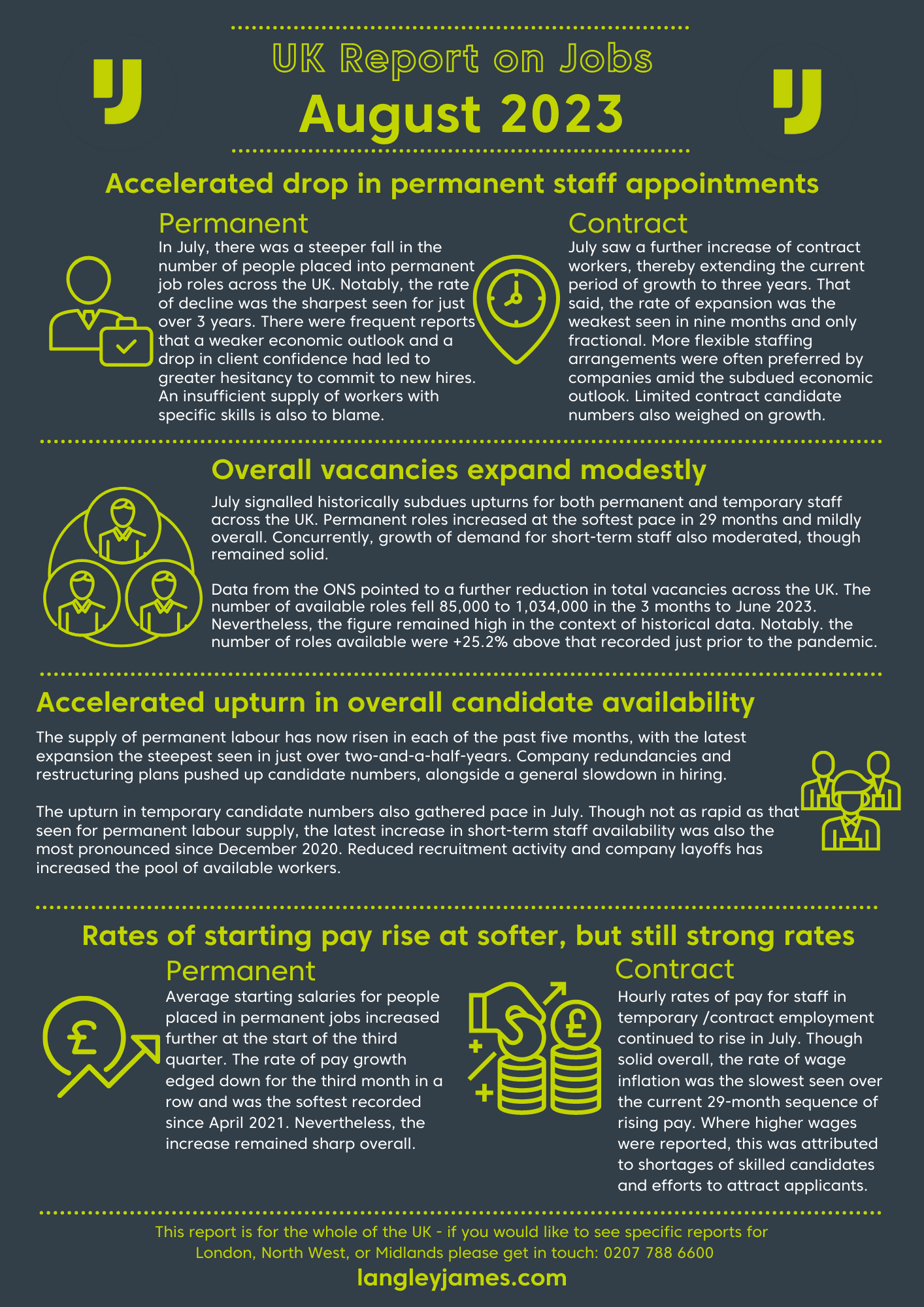

Jul 30, 2023 | Hiring Resources, IT, Tips
We’ve got some tech news to share. Recently, we came across an eye-opening article that shed light on the current state of the workforce in the UK. According to a recent poll, nearly half of UK workers feel that their work is becoming increasingly intense. And the blame seems to fall on staff shortages in the tech sector.
In this blog, we explore the impact of these shortages.
The Intensity of Work in the Tech Sector
The fast-paced world of technology has always been demanding. However, the current scenario is taking intensity to a whole new level. The poll indicates that almost 50% of UK employees are facing higher workloads, tighter deadlines, and increased pressure due to staff shortages. As more businesses rely heavily on technology, the demand for skilled IT professionals has soared. Therefore leading to a shortage that affects the entire industry.
The Ripple Effect on Tech Employees
With tech talent in high demand, the workforce is feeling the brunt of the shortages. Employees are working longer hours and feeling stretched thin. This is affecting not only their productivity but also their overall well-being. As a result, the importance of striking a balance between work and personal life has become more crucial than ever.
The Challenge for Employers
For employers, the shortage of IT talent presents a unique challenge. Attracting and retaining skilled tech professionals in this competitive landscape has become an uphill battle. Companies need to adapt their recruitment strategies and offer enticing packages that go beyond just financial rewards. Creating a positive work culture, providing growth opportunities, and offering work-life balance can be game-changers in attracting and keeping top talent.

The Role of IT Recruitment Agencies
This is where IT recruitment agencies, like ours, step in. Our mission is to bridge the gap between talented IT professionals and companies in need of their expertise. We understand the challenges faced by both job seekers and employers and work tirelessly to find the perfect match. Our friendly and dedicated team is committed to nurturing meaningful connections that go beyond just matching skills with job requirements.
Navigating the Future of Tech Talent
While the shortage of tech talent poses challenges, it also presents an opportunity for growth and innovation. As a community, we can navigate through these intense times together. At Langley James, we are passionate about making a difference. Our friendly approach, combined with our industry expertise, enables us to provide tailored solutions that address the unique needs of both job seekers and employers.
Our Thoughts
The poll results highlight the intensity of work experienced by employees in the UK due to staff shortages in the tech sector. As an IT recruitment company, we recognise the impact of these challenges on the workforce and are dedicated to finding innovative solutions. By working together, we can create a thriving tech industry that not only meets the demands of the digital age but also ensures the well-being and growth of its most valuable asset – its people.
About Langley James
At Langley James, we understand the ever-evolving landscape of the tech industry and the impact of staff shortages on your workforce. In this dynamic environment, effective talent management is more critical than ever. That’s why our approach goes beyond surface-level information provided in a CV alone.
With our comprehensive knowledge of candidates, including their experience, specific project involvements, strengths, and areas for improvement, we strive to find the perfect match for your business. Our dedicated and specialised consultants work closely with you, considering both the role requirements and the unique needs of your business.
We take immense pride in our thorough understanding of candidates’ skills and experiences, ensuring that we deliver the very best talent to meet your IT recruitment needs.
Let’s discuss your specific IT recruitment requirements today. Reach us at 0207 099 4839 or via email at langleyjames@langleyjames.com.
We’d love to hear your views on this. What are your thoughts on the impact of staff shortages on your team? Tweet us @ITRecruitment, or follow us on Facebook or LinkedIn

Jul 10, 2023 | Management, Tips
In today’s diverse workforce, managing different generations has become a fascinating challenge for hiring managers. With Generation Z, Millennials, and Generation X working side by side, understanding their unique characteristics and preferences is essential for fostering a harmonious and productive work environment. So, let’s dive into the world of these three generations and explore effective management strategies that can bridge the generation gap with a touch of fun along the way!
The Rise of Gen Z
Purpose-Driven and Digitally Savvy.
Generation Z, born between 1997 and 2012, brings a fresh perspective to the workplace. They value meaningful work that aligns with their personal purpose and societal impact.

Effectively managing Gen Z employees:
- Emphasise the purpose behind their work and how it contributes to the bigger picture.
- Leverage technology and communication platforms that resonate with them, such as collaborative tools.
- Offer regular feedback in short, digestible formats to cater to their shorter attention spans.
- Encourage a diverse and inclusive culture that fosters collaboration and innovation.
Millennials
Work-Life Balance, Flexibility, and Feedback.
Millennials, also known as Generation Y, were born between 1981 and 1996.

Effectively managing Millennials:
- Understand that they seek work-life balance and prioritize flexibility. Offering flexible schedules or remote work options can greatly enhance their job satisfaction.
- Provide regular constructive feedback and recognize their accomplishments to fuel their desire for approval.
- Create an environment that encourages continuous learning and growth opportunities, as Millennials are eager to develop their skills and advance in their careers.
Generation X
Communicate Honestly and Embrace Work Ethic.
Generation X, born between 1965 and 1980, is a generation that grew up in a different era.

Effectively managing Generation X:
- Opt for direct, frank communication rather than relying solely on niceties.
- Appreciate their strong work ethic and dedication. Acknowledge their long hours and commitment to achieving results.
- Utilize more traditional communication methods such as phone calls or emails, as they might prefer them over instant messaging platforms.
Bridging the Gap: Five Tips for Managing Multigenerational Teams:
- Foster cross-generational mentorship programs to encourage knowledge sharing and collaboration.
- Implement flexible work arrangements that accommodate different needs and preferences.
- Provide ongoing learning and development opportunities for all generations.
- Encourage open dialogue and understanding through team-building activities and workshops.
- Celebrate diversity and create an inclusive work environment where everyone’s voice is heard and valued.
Managing a multigenerational workforce requires adaptability, understanding, and a touch of humor. By recognizing the unique qualities and preferences of Generation Z, Millennials, and Generation X, hiring managers can cultivate a harmonious workplace where each generation can thrive. Embrace the diversity, bridge the generation gap, and enjoy the wealth of perspectives that each generation brings. Happy managing!
Remember, creating an engaging and fun work environment for all generations is the key to success in today’s dynamic and ever-evolving workplace landscape.
About Langley James
At Langley James, we understand the importance of effective talent management in today’s diverse workforce. With our comprehensive knowledge of candidates, including their experience, specific project involvements, strengths, and areas for improvement, we go beyond the surface-level information provided in a CV alone.
Our team of dedicated and specialised consultants is committed to finding the perfect match for your organisation, considering both the role requirements and the unique needs of your business. We take pride in our thorough understanding of candidates’ skills and experiences, ensuring that we deliver the very best talent to meet your IT recruitment needs.
To discuss your specific IT recruitment requirements, contact us at 0207 099 4839 or via email at langleyjames@langleyjames.com. Our team is eager to assist you in finding the right professionals who will contribute to your company’s success.
We’d love to hear your views on this. What are your thoughts on managing the generational mix in your IT team? Tweet us @ITRecruitment, or follow us on Facebook or LinkedIn

Jul 10, 2023 | IT, IT Market Reviews
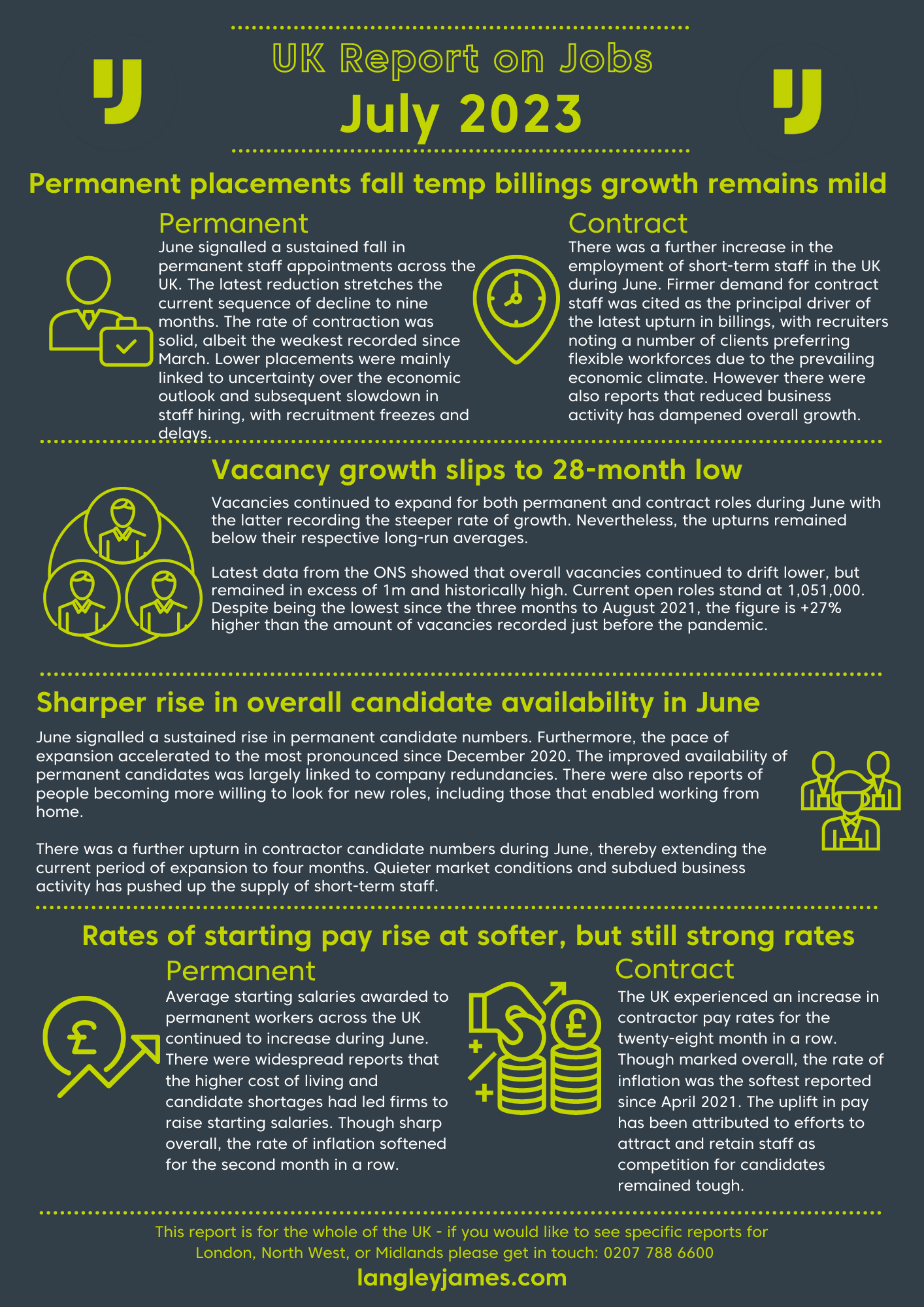
`

Jun 28, 2023 | Hiring Resources, IT
In today’s competitive IT landscape, hiring managers face a significant challenge—the ongoing IT skills crisis. The demand for skilled IT professionals continues to outpace the supply, making it increasingly difficult to find and secure top talent. However, with the right strategies and innovative approaches, hiring managers can successfully navigate this crisis and build a high-performing IT team. In this blog post, we’ll explore some effective solutions to help you overcome the IT skills shortage and find the ideal candidates for your organisation.
Hiring Mangers Should Embrace the Gig Economy
Incorporating the gig economy into your talent acquisition strategy can be a game-changer. By leveraging IT contractors, you can access a pool of specialised talent on-demand. This flexible arrangement allows you to quickly fill skill gaps and tackle short-term projects without long-term commitments.
Foster Internal Talent Development
Investing in the professional growth of your existing employees can be a strategic solution. Implement training programs, certifications, and mentorship opportunities to upskill and reskill your current team members. By nurturing internal talent, you can fill crucial roles internally and create a culture of continuous learning and advancement.
Tap into Professional IT Networks
Engage with professional IT networks, industry associations, and online communities. Participate in relevant events, conferences, and webinars to connect with IT professionals actively seeking new opportunities. Building relationships within these networks can provide access to a diverse pool of talent and valuable industry insights.
As a Hiring manager You Need to Leverage Social Media and Online Platforms
Harness the power of social media and online platforms to expand your reach and attract top IT talent. Maintain an active presence on platforms like LinkedIn, GitHub, and Stack Overflow. Share engaging content, job openings, and insights about your organisation’s work culture to create a strong employer brand and attract the attention of skilled candidates.
Collaborate with IT Recruitment Specialists
Partnering with an IT recruitment agency can be a strategic move. These specialists, like us, possess in-depth industry knowledge, an extensive network of IT professionals, and expertise in candidate sourcing and screening. They can streamline your recruitment process, saving you time and effort while connecting you with the right talent.
Offer Competitive Compensation and Benefits
To attract and retain top IT talent, it’s crucial to offer competitive compensation packages and attractive benefits. Stay up-to-date with market trends to ensure your salary offers align with industry standards. Additionally, consider flexible work arrangements, professional development opportunities, and perks that cater to IT professionals’ specific needs and preferences. Take a look at our latest IT Salary Guide to get up to date on the current salaries on offer for the most popular jobs in IT.

Hiring Managers Need to Streamline the Hiring Process
In a competitive talent market, a lengthy and complex hiring process can deter top candidates. Simplify and streamline your hiring process to ensure a positive candidate experience. Minimize unnecessary steps, provide prompt feedback, and communicate clearly with candidates to expedite the decision-making process.
Showcase Your Organisation’s Technological Advancements
Demonstrate your organization’s commitment to innovation by highlighting the exciting projects, cutting-edge technologies, and advancements in the IT space. Showcasing your technological prowess and the opportunity for IT professionals to work on meaningful and impactful projects can attract top talent and position your organization as a desirable employer.
Why Hiring Managers Should Work With Langley James
Here at Langley James, we know our candidates. We have in-depth knowledge of their experience, down to the individual projects they have worked on, their strengths (and their weaknesses). We have access to those details that you just can’t get from a CV alone.
Our talented and specialised consultants work hard to ensure that any candidates we send you are not only a perfect match for the role but your business.
To discuss your IT recruitment needs please call us on 0207 099 4839 or email us: langleyjames@langleyjames.com.
We’d love to hear your views on this. What are your thoughts on the current IT skills crisis? Tweet us @ITRecruitment, or follow us on Facebook or LinkedIn

Jun 19, 2023 | IT, Tips
We are in the middle of a long and sustained talent crisis. Candidate availability is decreasing by the day, and job vacancies continue to rise. Albeit at a slightly slower rate over the last few months. But the success of your business depends on your team. The people you hire have a direct impact on your success. So, when it comes to your next vacancy, you may be asking which is best for you – recruitment agency vs direct hiring.
We’ve asked our expert consultants to share their insight on the pros and cons of both to help you make that all important decision.
Agency vs Direct
We’ve written at length about the benefits of working with a specialised recruitment agency, but let’s compare some key areas when it comes to recruitment agency vs direct hiring.
Writing adverts
This may sound like a simple process, but don’t be fooled. Yes, it’s true that we can all write an advert stating the responsibilities and requirements. However, in the current market, that is not enough! Candidates are less likely to apply for a job with a list of demands. They want the story, the feeling, a sense of what you stand for. They want the benefits, the future opportunities, and a sense of being part of something important in the world.
If you don’t have experience of this, you are likely to find that your advert will be a bit of a ‘damp squid’ and won’t attract the people you need to make your business a continued success. Agencies are writing adverts day in, day out. They know what it takes to get the best response.
Access to candidates
A recruitment agency will have access to many more candidates than you will if you recruit direct. Not only do they have a large database of experienced candidates, but they are also able to advertise in lots of different ways. This means that you don’t just get the best people who are currently on the market. A recruiter will also headhunt suitable candidates for you using a combination of technology and their personal network. This means that your shortlist should be the very best candidates for the job.
Direct hiring tends to be focused on adverts, website pages and the odd social media post. The reach is not as great as that of a recruiter. With direct hiring, you are unlikely to have the tools you need to get your advert out as far as it needs to go. Lots of companies use their own employees to recommend candidates. Whilst this is great in some instances, it can have an impact on your diversity. Something to bear in mind with any employee referral scheme.
Sifting through CV’s – Recruitment Agency vs Direct Hiring
Depending on how much time you have, it could be a benefit for you to read through all the applications you receive if you do decide direct hiring is for you. The advantages are that you see not just shortlisted candidates, but every single response. This will give you a real insight into the market (if your job advert is great!) and may give you insight on what you need to change to attract the best.
You’ve also got to have the technical knowledge when it comes to IT. You may be looking for experience in a particular piece of tech. And unless you’re aware of other technologies where skills can easily transfer, you could be missing out on a great candidate!
Either way, be prepared to spend lots of time looking at unsuitable CVs as the pay-off for direct hiring. However, if you don’t have the extra time needed to go through the process, using a recruitment agency van be a valuable way of finding new talent for your business. Shortlisting is completed on your behalf, and you only have to choose who to interview from a shortlist of CVs.

Employer branding
You’ve probably heard more and more people start to talk about employer branding. It’s a vital part of the direct hiring process. When was the last time you reviewed yours? What does your Glassdoor say about you? How are your Google reviews? There are many things to consider when recruiting direct when it comes to how you are perceived in the market.
However, we know that there are some really great companies to work for our there who don’t have any employer brand at all. And if this is you then using a recruitment agency is the best idea. Recruitment consultants are highly skilled at attracting candidates to opportunities. They sell the opportunity first and the company a very close second. This gives the added benefit that any questions candidates have about your values, culture, and more, can be answered directly. So, whether you have a strong employer brand or not, you’ll still get the best candidates using a recruitment agency.
The same can be said for candidate experience too. If you already have a robust recruitment communication process, great, direct hiring could be for you. But remember that candidates expect a response within 24 hours of their application now. They expect to be kept up to date at every stage in the process. Do you have the time and organisation to do that effectively?
Cost
There’s a general misconception in the market that using recruitment agencies can be costly. But this is usually when it’s looked at in isolation and not compared to direct hiring. If you wanted to do the same work as a recruiter does, it could end up costing you considerably more. And this cost increases if you’re not regularly recruiting. Recruitment agencies spend hundreds of thousands of pounds behind the scenes to make sure that they are providing the best service and the best candidates.
You’d be amazed how much it costs to just advertise a job on one job board, let along over 30! Access to CV databases is also at a great cost, and let’s not get started on the costs associated with LinkedIn! Then there’s the time spent searching out the best candidates. At Langley James, we allocate at least 3 full days just to shortlist candidates for you. And in the current market, this can take longer too.
But there’s one huge benefit when it comes to cost. Recruitment agencies will not charge you a penny until they have been successful, regardless of the time spent on the role. This is something you can’t do with direct hiring. You take a financial risk every time you recruit direct – there are no guarantees of success.
Recruitment Agency Vs Direct Hiring – Summary
If you have lots of time on your hands, and an ‘easy to fill’ role then direct hiring will probably work for you. But, if you have a harder to fill role but you still want the very best candidates, without having to invest your own time, you need the help of a recruitment agency.
About Langley James
We have been helping companies to attract and retain the very best IT talent since 1999. But we don’t just simply find the best candidates. We can advise you on the current jobs market conditions. Share data on average IT salaries. Talk to you about the benefits that candidates are looking for. In fact, we do everything we can to help ensure that you get the very best people for your team. Get in touch with our team to find out how we can help you to recruit the best!

Jun 9, 2023 | IT, IT Market Reviews
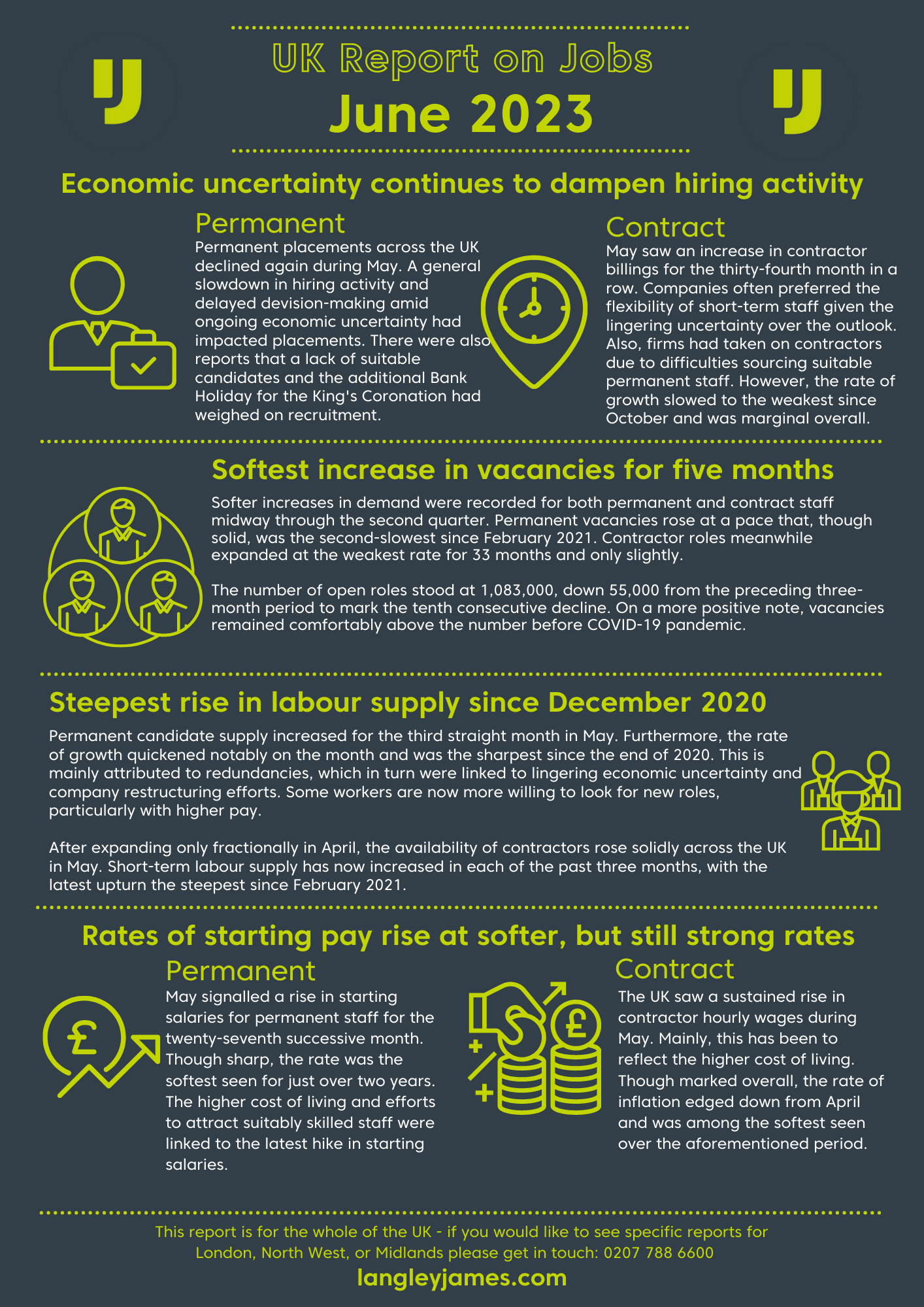

May 18, 2023 | Hiring Resources, IT, Tips
Hey there, IT hiring managers! Are you tired of sifting through endless resumes? Conducting countless interviews, and still struggling to find that perfect candidate? Well, fear not! We’ve got a secret weapon up our sleeves that will revolutionise your talent acquisition game.
Enter the world of IT recruitment agencies. Where the magic of matching exceptional talent with the perfect job happens. Buckle up and let’s explore why IT recruitment agencies are the game-changers in today’s IT recruitment market.
IT Recruitment Agencies Provide Supercharged Sourcing
Gone are the days of scouring job boards and drowning in a sea of unqualified applicants. IT recruitment agencies have an extensive network, And a knack for sniffing out top talent. With their industry connections, they have access to a hidden pool of skilled professionals. Some who might not be actively looking but are open to exciting opportunities. Let us do the digging and present you with a shortlist of exceptional candidates. Saving you time and headaches.
Navigating the IT Talent Jungle
In a highly competitive market, finding the right IT talent can feel like searching for a needle in a haystack. But fear not! IT recruitment agencies are the seasoned navigators of this talent jungle. We know what skills and expertise to look for. And we can spot those hidden gems that others might overlook. Consider us your trusty safari guides, equipped with a keen eye for talent.
Tap Into The Matchmaking Mastery of IT Recruitment Agencies
Finding the perfect match between a candidate and a job isn’t just a lucky coincidence. It’s an art. IT recruitment agencies excel at this matchmaking dance. We take the time to understand your company’s culture, values, and specific job requirements. Armed with this knowledge, we dive deep into our pool of talented candidates, We evaluate not just their technical skills but also their personality fit. It’s like finding a puzzle piece that fits perfectly, creating a harmonious and productive work environment.

Unleashing Unconventional Talent
Sometimes, the most extraordinary talent lies outside the box. IT recruitment agencies have a knack for identifying those unconventional candidates. Those who bring fresh perspectives, innovative ideas, and unique problem-solving skills to the table. We believe in thinking outside the binary code, and we’re not afraid to challenge the status quo. Embrace the power of diversity and let us introduce you to the game-changers who will push your company to new heights.
IT Recruitment Agencies Are Your Silent Partners
Picture this: you’re in the midst of a talent war, and you need reinforcements ASAP. That’s where IT recruitment agencies become your silent partners. Working tirelessly behind the scenes to scout, screen, and secure the best talent for your team. We become an extension of your HR department, collaborating seamlessly to fulfill your staffing needs. From negotiating offers to managing onboarding, consider us your backstage crew, ensuring a smooth and successful hiring process.
About Langley James
Here at Langley James, we know our candidates. We have in-depth knowledge of their experience, down to the individual projects they have worked on, their strengths (and their weaknesses). We have access to those details that you just can’t get from a CV alone.
Our talented and specialised consultants work hard to ensure that any candidates we send you are not only a perfect match for the role but your business.
So, are you ready to embrace the power of IT recruitment agencies? We’re here to be your allies, your advocates, and your partners in talent acquisition. Together, we’ll revolutionise your hiring process, saving you time, energy, and headaches. Let’s embark on this adventure together and discover the exceptional talent that will propel your company to new frontiers.
To discuss your IT recruitment needs please call us on 0207 099 4839 or email us: langleyjames@langleyjames.com.
We’d love to hear your views on this. What are your thoughts on the current IT recruitment maket? Tweet us @ITRecruitment, or follow us on Facebook or LinkedIn

May 12, 2023 | IT, IT Market Reviews
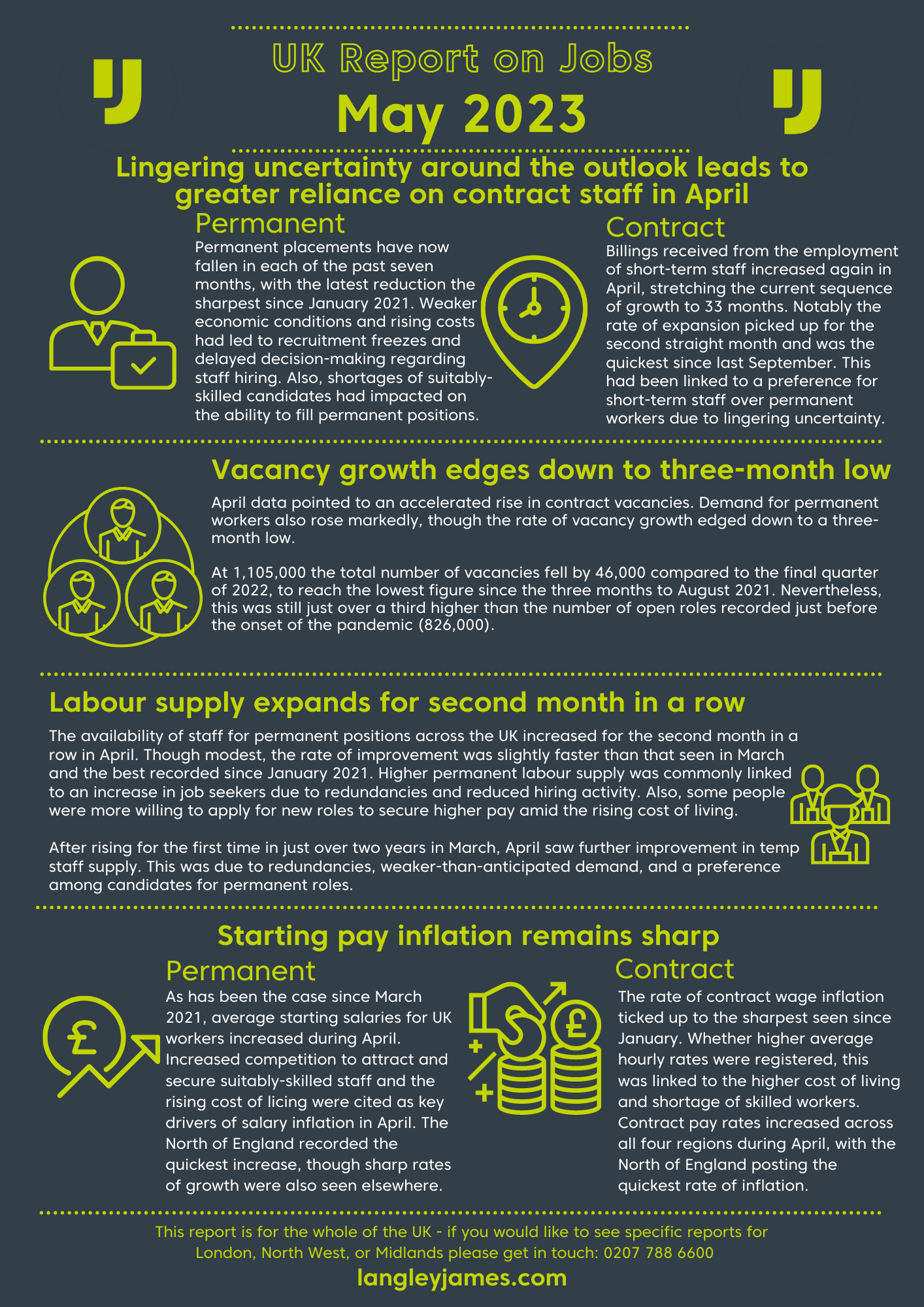

May 5, 2023 | Tips
Are you sick of throwing your job postings into the abyss of job boards and waiting for a miracle? We thought so. Because let’s be real, it’s not the most effective way to score the top IT talent out there.
Here’s why:
The best candidates are not on the job boards
And, the best candidates are not actively looking for jobs. One of the biggest problems with job boards is that they are passive. They rely on candidates to actively search and apply for jobs. However, the best candidates are often not actively looking for jobs. They may be open to new opportunities, but they’re not going to spend hours sifting through job board postings. This means that you’re missing out on a large pool of potential talent if you’re only relying on job boards.
Job boards don’t drive qualified candidates back to your company
Job boards are a terrible way to find qualified candidates. They’re great at finding people who are looking for jobs, but not so great at finding the right ones.
The problem is that job boards don’t really care about your company or the type of person you need. They just want to get as many applicants as possible in front of employers to justify their fee. So when you post an opening on one of these sites, it’s likely that lots of unqualified people will apply. And there goes your time wasted sifting through irrelevant CVs! Worst still, what if no one applies, (and this does happen!) – what then?
Only 1 in 20 applicants are actually a fit
As you may have noticed, there are a lot of people looking for jobs on job boards. And as you also might have noticed (if you’ve ever applied for one), most of them aren’t qualified. The result? You get a lot of low-quality candidates–people who don’t meet your requirements or have any relevant experience.
Many companies have tried these boards to find their next IT employee, only to find that they end up with more low-quality applicants than good ones. They then wonder why this keeps happening! So let’s go back to what we said earlier – job boards are great sources of passive candidates. However, when it comes down to actually finding the best people in your industry and getting them interested in working for your company, job boards just don’t cut it anymore.

Good candidates get lost
Job boards are crowded, and your job posting can easily get lost in the noise. Candidates may scroll past your posting or not even see it at all. This means that even if you do get good candidates applying, they may not be the right fit for the job or your company. You’re not getting the cream of the crop, and you may end up settling for a candidate who is just okay. You’re better than that!
It can even lower your employer brand
You might be thinking, “but my company has a great employer brand”. And you’d be right – it’s likely that you do have a great employer brand. But it’s probably not as good as you think it is if you use job boards. Job boards are not a good way to attract candidates; they’re a way to get them in front of your eyes so you can reject them later on. Job boards also aren’t effective at building relationships with candidates. Something that’s key in a skills crisis. The lack of personal approach is a problem.
So even if there are some great candidates on the boards, is you advert enough to tempt them? Worst still, in today’s market where applications are few and far between it can mean advertising your vacancy multiple times. You go and do the same thing, and expect a different result. But advertising your role multiple times screams that there’s something wrong, That you are unable to fill the vacancy and this worries candidates and will prevent them from applying.
What to do instead of using job boards
When it comes to finding the best talent for your IT team, working with a recruitment agency like Langley James can be a game changer. Not only do we have years of experience sourcing candidates and matching them with top companies, but we also have access to a much larger pool of potential hires than you would find on a job board. But that’s not all.
There’s lots of other advantages to working with a recruiter.
- Recruiters have relationships with a wide range of candidates who may not be actively looking, but who would be a great fit for your company. We can help you tap into this pool of hidden talent and find the perfect candidate for your team.
- We can do much of the legwork for you. We take the time to review CVs, screen candidates, and present you with a shortlist of top contenders. This not only saves you time, but it also ensures that you’re only interviewing candidates who are a great fit for the role.
- In addition to having access to a wider pool of candidates and saving you time, recruiters can also help you navigate the complex world of IT hiring. We understand the ins and outs of the industry and can help you identify the skills and experience that are most important for your specific role. We can also help you develop competitive compensation packages and negotiate with candidates on your behalf.
At the end of the day, while job boards can be a useful tool in your recruitment arsenal, they’re far from the best way to find top IT talent. Working with a recruitment agency like Langley James can help you tap into a wider pool of candidates, save you time, and help you navigate the complexities of the hiring process. So if you’re serious about finding the best talent for your team, reach out to us today and let us help you find your next superstar.

Apr 12, 2023 | IT, IT Market Reviews
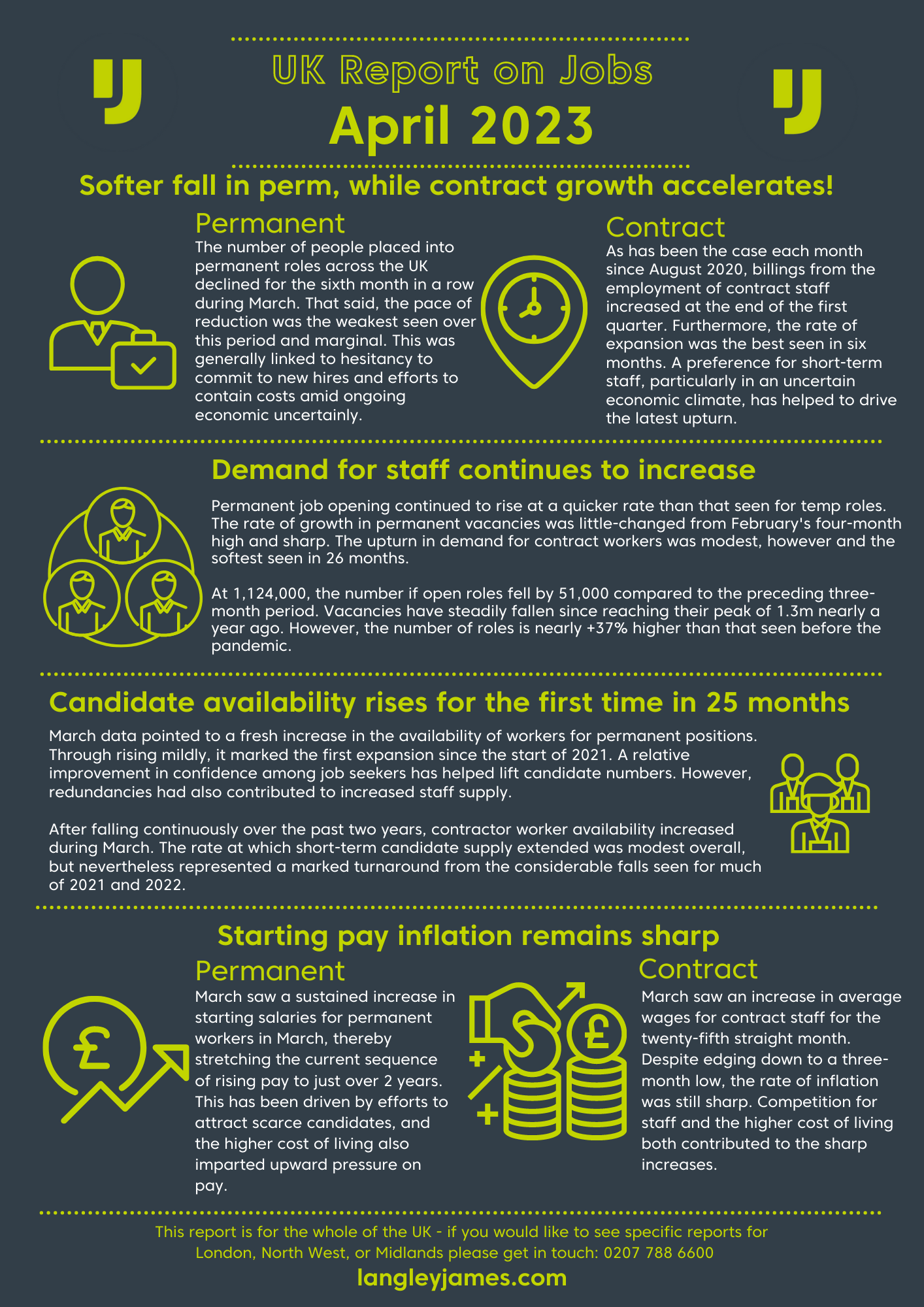

Apr 6, 2023 | Hiring Resources, IT, Tips
We’ve been in the IT recruitment sector since 1999, so we’ve seen firsthand the impact that a bad hire can have on a business. Hiring the wrong person for an IT position can be costly in more ways than one, and the consequences can last for months or even years. In this blog, we’ll explore the true cost of a bad hire in IT, and offer some tips for avoiding this common pitfall.
The direct costs of a bad hire
One of the most obvious costs of a bad IT hire is the direct financial impact. According to the Recruitment & Employment Confederation (REC), 85% of organisations admit their company has made a bad hire. Shockingly, the average cost of a mid-manager level with a salary of £42,000 can cost a business more than £132,000. This includes the cost of advertising the job, screening candidates, conducting interviews, and training the new employee. If the employee leaves the company shortly after being hired, the costs can be even higher, as the company may need to start the hiring process all over again.
In addition to the financial costs, a bad hire can also have a negative impact on productivity. What if the new employee is not able to perform their job duties effectively? Other team members may need to pick up the slack, leading to decreased efficiency and potentially missed deadlines.
The indirect costs of a bad hire
Beyond the direct costs, there are also indirect costs associated with a bad IT hire. For example, a bad hire can have a negative impact on team morale. If the new employee is not a good fit for the team, other team members may become frustrated or disengage. This can lead to decreased motivation and productivity.
A bad hire can also damage the reputation of the company, especially if the employee interacts with clients or customers. If the new employee provides poor customer service or makes mistakes on important projects, it can lead to lost business and damage to the company’s brand.
The hidden costs of a bad hire
Finally, there are hidden costs associated with a bad IT hire that may not be immediately apparent. For example, a bad hire can lead to turnover in other areas of the company. If other team members become frustrated with the new employee, they may start looking for new job opportunities, leading to increased turnover and the need to hire and train new employees.
A bad hire can also have a negative impact on the culture of the company. If the new employee is not a good fit for the company culture, it can lead to decreased employee engagement and satisfaction. Potentially this can even lead to increased absenteeism or turnover.

How to avoid a bad hire in IT
Given the many costs associated with a bad IT hire, it’s important to take steps to avoid this common pitfall. Here are a few tips for ensuring that you hire the right person for the job:
- Define the role clearly. Before you start the hiring process, take the time to clearly define the role and its responsibilities. This will help you identify the skills and experience that are required for the job. Additionally it will ensure that you’re able to evaluate candidates effectively.
- Use multiple methods to evaluate candidates. Don’t rely solely on CVs and interviews to evaluate candidates. Consider using other methods, such as skills assessments or personality tests. This will enable you to have a more complete picture of each candidate’s abilities and fit for the role.
- Check references carefully. Don’t skip the reference check stage, even if you think you’ve found the perfect candidate. Be sure to ask for references from previous managers or colleagues. And ask specific questions about the candidate’s strengths and weaknesses, work style, and ability to work well with others.
- Look beyond technical skills. While technical skills are obviously important for an IT role, it’s also important to consider other factors, such as cultural fit and communication skills. Look for candidates who are able to work well with others
In conclusion
The true cost of a bad hire in IT extends far beyond the financial investment required to fill the role. A bad hire can impact team morale, productivity, and reputation. It may even lead to increased turnover and decreased employee engagement. However, by taking steps to define the role clearly, evaluate candidates using multiple methods, check references carefully, and look beyond technical skills, companies can avoid the many costs associated with a bad IT hire.
How Langley James can help you avoid a bad hire
We has extensive experience in helping businesses avoid the costs and headaches associated with a bad IT hire. Here are a few ways in which we can help:
- In-depth candidate evaluation: We use a multi-stage evaluation process to assess candidates’ technical skills, experience, and cultural fit. This includes an in-depth interview, ensuring that we have a complete picture of each candidate’s abilities and fit for the role.
- Industry expertise: Our recruiters have deep industry expertise, with a focus on IT recruitment. This means that we understand the specific skills and experience required for IT roles, and can identify top candidates who may be overlooked by other recruiters.
- Extensive network: We have an extensive network of IT professionals, including both active and passive job seekers. This allows us to quickly identify top talent and connect them with the right job opportunities.
- Ongoing support: We provide ongoing support throughout the hiring process, including reference checking, and negotiation support. This ensures that both employers and candidates are set up for success from the start.
By working with Langley James, businesses can avoid the many costs associated with a bad IT hire and instead find the best talent for your needs. Our experienced recruiters are here to help, whether you’re looking to fill a permanent or contract IT role. Contact us today to learn more about how we can help your business succeed.

Mar 15, 2023 | Hiring Resources, Tips
With the growing demand for IT contractors, employers need to know how to successfully interview and hire the right professionals for their projects. This guide will provide tips on how to identify the best IT contractors, create a successful interviewing process, and make sure that you are hiring the right person for the job.
From understanding what type of IT contractor you need, to asking the right questions during an interview, this guide will help employers find the perfect candidate for their project. It will also provide insights on how to ensure that you are making a wise decision when it comes to hiring an IT contractor.
The Advantages of Hiring IT Contractors
Hiring an IT contractor can be a great way to get the most out of your IT budget. With the right contractor, you can get access to experienced and knowledgeable professionals who can provide you with the technical expertise you need for your projects. From software development to cybersecurity and networking, there are many benefits of hiring an IT contractor that can help your business succeed.
IT contractors are often more cost-effective than hiring full-time staff, as they don’t require long-term commitments or benefits packages. They also offer flexibility, allowing businesses to scale up or down depending on their needs. Freelance IT contractors can also bring specialized skillsets and knowledge that may not be available in-house. By leveraging their expertise, businesses can save time and money while still achieving their goals.
You may find our blog 8 Reasons to Hire an IT Contractor of interest too.
The Basics of Interviewing & Hiring an IT Contractor
Hiring an IT contractor can be a daunting task, especially when you don’t have much experience in the area. It’s important to remember that interviewing and hiring an IT contractor requires more than just asking the right questions. You need to understand the basics of interviewing and hiring an IT contractor in order to be successful.
Tips on How to Make Sure You Hire The Best IT Contractors
As an employer, it’s essential to make sure you hire the best IT contractors for your business. Hiring the right candidate can be a daunting task, and it requires a lot of effort on the part of employers. However, with the right hiring practices in place, employers can ensure that they are hiring top candidates who will help them meet their business goals. The following are some tips for hiring the perfect IT contractor for your business.
- Hire candidates who understand your industry, and have a good understanding of what you do. This is key because it will give them insights into how your business operates and allow them to be more prepared when they’re interviewing with you.
- Set clear expectations from the start so that both parties know what they are getting themselves into. For example, if you need someone to come in and maintain all of your company’s computer systems and networks, make sure the candidate understands this before verbally accepting their job offer .This will make the process more efficient and will help reduce the amount of time you spend interviewing candidates.
- Ask questions that can determine whether your candidate is a good fit.

Top 5 Questions to Ask IT Contractors During the Interview
Hiring an IT contractor is a big decision, and it’s important to ensure that you ask the right questions during the interview process. In this article, we will discuss the top 5 questions to ask a potential IT contractor during an interview. These questions will help you get a better understanding of the candidate’s skillset, experience, and working style. By asking these questions, you can make sure that you hire the best IT contractor for your project.
1. How Much Experience Do You Have with __________?
This question is a good way to get an idea of the candidate’s experience working on similar projects and for similar companies. The more experience the IT contractor has, the better their chances of success will be. It’s also a good question to ask if the project requires specialised skills that may not be related to what they provide as a typical job function. For example, if your project requires strong Excel skills but their job title doesn’t mention anything about it, this is a good question to ask during your interview to prevent you from hiring the wrong person.
2. How Long Have You Worked As A Contractor?
This question will give you a good idea of what type of experience your IT contractor has had with similar companies, how long they’ve been there, and how well they may be able to adapt to new projects and responsibilities. It will also help you determine if they are used to working on projects that are or have been outsourced, as many companies outsource their IT work these days. .
3. How Do You Feel About the Number of Hours We Have for Work?
A lot of IT contractors work a set amount of hours per week, but others are on-call or work from home from time to time. This question can help you see if your IT contractor prefers being in an office or if they would rather be able to balance their personal life with their job. .
4. Are You Willing to Travel?
IT contractors may need to travel for meetings or training during their career progression. Most IT contractors don’t mind traveling as long as it has been scheduled in advance and is well paid for the time spent away from home and family.
5. Tell Me About Your People Skills
IT contracting isn’t just about technical skills–it’s also about being able to interact with other people on a personal level and having appropriate communication skills.
About Langley James
Here at Langley James, we know our candidates. We have in-depth knowledge of their experience, down to the individual projects they have worked on, their strengths (and their weaknesses). We have access to those details that you just can’t get from a CV alone.
Our talented and specialised consultants work hard to ensure that any candidates we send you are not only a perfect match for the role but your business. To discuss your IT recruitment needs please call us on 0207 099 4839 or email us: langleyjames@langleyjames.com.
We’d love to hear your views on this. Are you struggling to recruit IT staff? Tweet us @ITRecruitment, or follow us on Facebook or LinkedIn

Mar 14, 2023 | IT, Tips
Is it time for your business to hire an IT contractor? With a continuously shrinking talent pool and an increasing demand for talent, it can mean that recruiting the perfect permanent candidate takes longer than before. But your business still needs to succeed. What isn’t being achieved whilst you are waiting for the right candidate. What impact is that having on your business. In a perfect world, you’d wait for the right IT candidate, but if we’ve learnt anything from the past few years, we do not live in a perfect world.
However, there are positives. The changing needs of organisations and employees alike has resulted in more IT candidates moving to non-standard employment. The quality and diversity of IT talent makes the contract market an attractive prospect for many employers. So if you are still waiting to find the perfect candidate, or have a need for a specific talent as soon as possible, it may be time to hire an IT contractor.
8 key reasons to hire an IT contractor
- Less risk. As many as 60% of new hires are not working out to some degree, according to the latest research! And when a bad hire costs businesses, on average, around £114,000 per employee, it’s a risk a lot of businesses can’t afford to take. Especially in the current market. When you hire an IT contractor, it mitigates the risk of bringing in a poor hire and the associated costs.
- Perfect for projects. Most projects, whether one off, or ongoing, need access to a particular set of skills. If you don’t currently have the skills in house and you are unable to secure the right permanent candidate, it’s time to hire an IT contractor. It may be that you have a short-term project and don’t have the budget, or the on-going work to hire a permanent. More on budget later.
- Specialist skills. If there is a skills gap in your current team, you can hire an IT contractor to plug that gap. By hiring a contractor, you can maintain the quality of work while an employee is away from the business. Whether that be extended sick leave, parental leave, or resignation. Hiring an IT contractor is a quick way to enable you to continue with business as usual.
- Ease workload. When someone leaves your team, who picks up the additional workload? Your current team. This can put additional strain on your existing team members and can even result in additional resignations. Reduce the likelihood of this when you hire a contractor.

- Tap into a fresh perspective. Most of the time, when you hire a contract, you tap into a huge amount of expertise. Having someone in your team who has a lot of experience working for multiple companies can really be more beneficial than you realise. Using their past experiences, they can bring new and exciting things to your business, meaning you could be in a position to tap into this a fast-track certain areas of growth.
- Flexibility. If you have a project that needs completing, or you are experiencing a temporary increase in work, an IT contractor could be the perfect answer. Also, if you suddenly have a drop in demand, you don’t have to continue to use the services on a contractor. This can save your business money by only paying for the services of a contractor when you need them.
- Cost savings. Yes, it’s true that contractor rates are usually more expensive than a permanent salary. However, it can still work out cheaper to hire a contractor. With a contractor, the daily rate is all you pay. There’s no paying into pensions or other benefits. It gives a certainly of cost so works particularly well if you have a set budget.
- Speed. Most IT contractors are available at short notice and are ready and prepared to start work. No more waiting for notice periods, where literally anything can happen. With the market as it is, there are many candidates being offered multiple jobs in IT and this makes the notice period an unnerving time. Reduce that risk and get someone in place quickly when you hire an IT contractor.
Using Langley James to hire an IT contractor.
We can supply you with an expert IT contractor, within budget, to carry out your project to a strict timeframe. Giving you peace of mind by knowing the exact cost of the project from the outset. And allowing day to day IT operations to carry on as seamlessly as possible.
Let us find you an expert IT Contractor who not only has the t-shirt but is going back to remake the film. Now is a great time to get on with those projects that have been hanging around and getting specialist contractors has never been cheaper than it is now. You can buy in an expert who can turn a project around to a set schedule and budget.
We have been recruiting IT contractors and permanent IT staff since 1999. We have an extensive network of experienced contractors as result. Get in touch with our expert team today to find out more about hiring an IT contractor today.

Mar 14, 2023 | IT, Tips
Are you currently looking to hire in IT? If so, there’s a lot to consider. And it may be that the first thing you need to decide is the benefits to you of contract v permanent. Which will you choose when it comes to filling your next IT role? There are advantages and disadvantages of both. Our consultants share their thoughts to help you make the right decision.
What’s the difference? Contract v permanent
A contractor is someone who provides their services to your business. Typically, a contractor is hired for a set period of time, or a set piece of work. A daily rate will be agreed, along with deliverables, deadlines etc. Contractors are usually self-managed and can be left to work independently based on the project brief.
A permanent candidate is an employee that works for you on either a full or part-til basis. They are expected to produce work based on their contract of employment and in return, they are paid a monthly salary on a continuous basis.
Pros and cons of hiring a contractor
When it comes to contract v permanent, it’s important to consider the pros and cons of each. Here’s our top 3 for each –
Pros of hiring a contractor
- Hire as and when you have a need. If you have a project that needs completing, or you are experiencing a temporary increase in work, a contractor could be the perfect answer. Also, if you suddenly have a drop in demand, you don’t have to continue to use the services on a contractor. This can save your business money but only paying for the services of a contractor when you need them.
- It can actually work out cheaper. Yes, it’s true that contractor rates are usually more expensive than a permanent salary. However, it can still work out cheaper to hire a contractor. With a contractor, the daily rate is all you pay. There’s no paying into pensions or other benefits. It gives a certainly of cost so works particularly well if you have a set budget.
- Higher level of expertise. Most of the time, when you hire a contract, you tap into a huge amount of expertise. Having someone in your team who has a lot of experience working for multiple companies can really be more beneficial than you realise. Using their past experiences, they can bring new and exciting things to your business, meaning you could be in a position to tap into this a fast track certain areas of growth.

Cons of hiring a contractor
- Continuity. If you want to turn the services of a contractor on and off, you could end up disappointed. Once a project is complete and the contract has come to an end, the contractor will move on to their next role. Therefore, if you want the same contractor back again a few months later, it may not always be that simple.
- Day rates can be high. We touched on this above. But, day rates can be high when compared to the salary of a permanent member of staff. Contractors looks for higher rates due to the risks associated with the role not being permanent
- IR35 rules – be aware. You can face large penalties if you are in breach of IR35 and need to take extreme care. Make sure that you work with a reputable agency to ensure that you are hiring contractor legitimately.
Pros and cons of hiring a permanent employee
Pros of hiring a permanent employee
- Higher level of control. With an employee, you decide when, where and how they work. They are employed directly for you (and in most cases, only you if full-time), so you get to call the shots.
- Commitment. When you hire a permanent employee, you both agree on the details of an employment contract. This is a long-term consideration for the employee. Therefore, when they agree to be employed, they are fully dedicated to your company.
- Employee engagement levels. A permanent employee has made a choice to join your company as part of their career development. They are more likely to align with your values and are therefore likely to be highly engaged.
Cons of hiring a permanent employee
- Commitment. Both a pro and co on hiring permanent employee! You need to be sure that you will be able to pay a monthly salary, plus all the additional costs, every month despite ups and downs.
- Employee rights. There’s lots to remember here, from holiday pay, redundancy, maternity, sick pay and lots more.
- It can work out more expensive. There’s lots of things that can affect your costs when hiring a permanent employee. From paying agency fees, to higher salaries, you need to have a budget up front. However, to retain your staff, it’s likely that you will also have to invest in training and development too.
Contract v Permanent – which will you choose?
We’ve been helping companies to recruit the very best in IT since 1999. We can advise you on which route is best and can even give you detailed insight into the IT jobs market. Each month, we produce our IT Salary Guide which looks at average salaries and day rates across all areas of IT. We also produce a monthly Report on Jobs so that you can see what’s happening in the market. As ever, we are here to help. So if you are looking to recruit into your IT team, get in touch with our expert consultants today.

Mar 8, 2023 | IT, IT Market Reviews
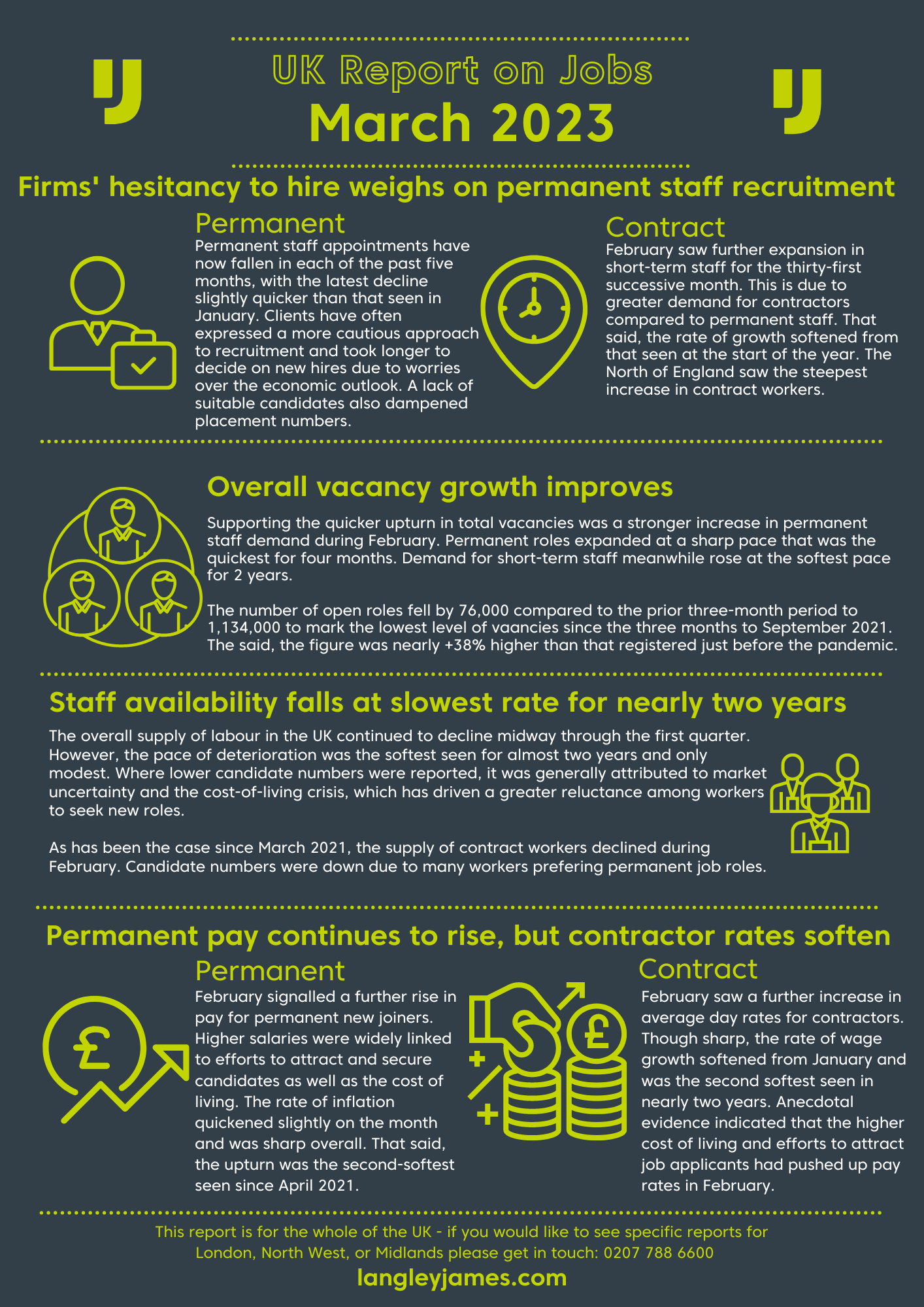

Feb 23, 2023 | IT, Management, Tips
It’s not enough to hire the best IT staff. You must also keep them on board
Hiring the best IT people is not enough to ensure success. It’s equally important to ensure that these talented individuals stay on board. How to retain IT staff is a challenge for many companies. They struggle with keeping their top-notch talent engaged and motivated.
The key to successful IT staff retention lies in your environment. It should encourage collaboration, innovation and creativity. Companies should also provide competitive salaries and attractive benefits packages. Therefore ensuring that their IT professionals remain committed and loyal. Additionally, offering training opportunities and career development is key. This can help create a sense of job satisfaction. In turn, leading to better retention rates among your team.
Give employees ample opportunities to grow and advance
Investing in the professional development of your IT staff is a key factor for success. It’s important to provide them with ample opportunities to grow. And toadvance their careers within your company. By offering employee training, you can give your IT staff the skills they need. Enabling them to become more productive and efficient. You can also offer professional development courses that are tailored to their individual needs. This allows them to gain new skills and knowledge. And this will help them succeed in their current roles. With these opportunities, you can create a culture of learning within your company. And this will lead to greater job satisfaction and higher IT staff retention rates.
But it’s not just about training. If you’re pushing your IT staff to do new projects, it’s going to keep them engaged. But don’t stop there! Encourage them to get more out of the technology you already have. Allow them to also investigate new technologies and how they can evolve the business. They’ll feel like they’re a part of the growth of your company, and they’ll be excited about their job—which means they’ll do it better. And that’s what we call a win-win situation!

Make sure your IT staff are adequately compensated for their skill level, talents and experience
Having a competitive IT salary structure is essential for any successful business. It is important to ensure that your IT staff are adequately compensated for their skill level, talents and experience. This will not only help you attract and retain the best talent. Additionally, it will ensure that your company remains competitive in the market.
It is important to review salaries regularly. You need to make sure they are in line with industry standards. Additionally they should reflect the value of each employee’s contributions. It is also important to consider other factors. Things such as cost of living and job market conditions. With a proper salary structure, you can ensure that your IT staff are adequately compensated for their efforts. Therefore making them feel rewarded them for their hard work.
Give your team adequate tools and resources
Having the right tools and resources is essential. This ensures that your team can complete their tasks without having to manage around inadequate technology. Having access to the best technology and resources allows teams to be more productive, efficient, and successful. With the right tools and resources, your team will be able to create better results faster and with less effort. This will result in a higher level of satisfaction from both your employees and customers. Investing in adequate tools and resources for your team is an investment that will pay off in the long run.
Foster a culture of collaboration, inclusivity and transparency
Building an inclusive IT team is a critical step in retention. Fostering a culture of collaboration, inclusivity, and transparency. Inclusivity. This means that everyone on the team is given an equal opportunity to contribute and be heard. This can be achieved by creating an environment where everyone feels comfortable. Where they can express their ideas and opinions without fear of judgement or criticism.
Therefore, it is important to create an environment where all members feel respected and valued. Regardless of their background or experience level. This can be done by providing regular feedback. Encourage open communication between members, and recognise individual contributions. Additionally, it is important to ensure that everyone has access to the same resources so they can do their best work. Creating a culture of collaboration, inclusivity, and transparency within your IT teams. This way you can ensure that all members are working together towards common goals. And with mutual respect for each other’s skillsets and perspectives.

Your success as a business depends on retaining talented IT staff
The success of any business today depends heavily on its ability to retain talented IT staff. As technology continues to evolve, businesses need to stay ahead of the curve and hire the best IT professionals available. The right IT professionals can provide businesses with a competitive edge. Therefore, helping them remain successful in their respective industries.
IT professionals bring a unique set of skills that are essential for any business’s success. They can help businesses develop efficient systems, manage data, and keep up with technological trends. They also have the ability to solve complex problems quickly and accurately. This is key for any business’s growth and development.
About Langley James
Here at Langley James, we know our candidates. We have in-depth knowledge of their experience, down to the individual projects they have worked on, their strengths (and their weaknesses). We have access to those details that you just can’t get from a CV alone.
Our talented and specialised consultants work hard to ensure that any candidates we send you are not only a perfect match for the role but your business. To discuss your IT recruitment needs please call us on 0207 099 4839 or email us: langleyjames@langleyjames.com.
We’d love to hear your views on this. Are you struggling to retain your IT staff? Tweet us @ITRecruitment, or follow us on Facebook or LinkedIn

Feb 8, 2023 | IT, IT Market Reviews
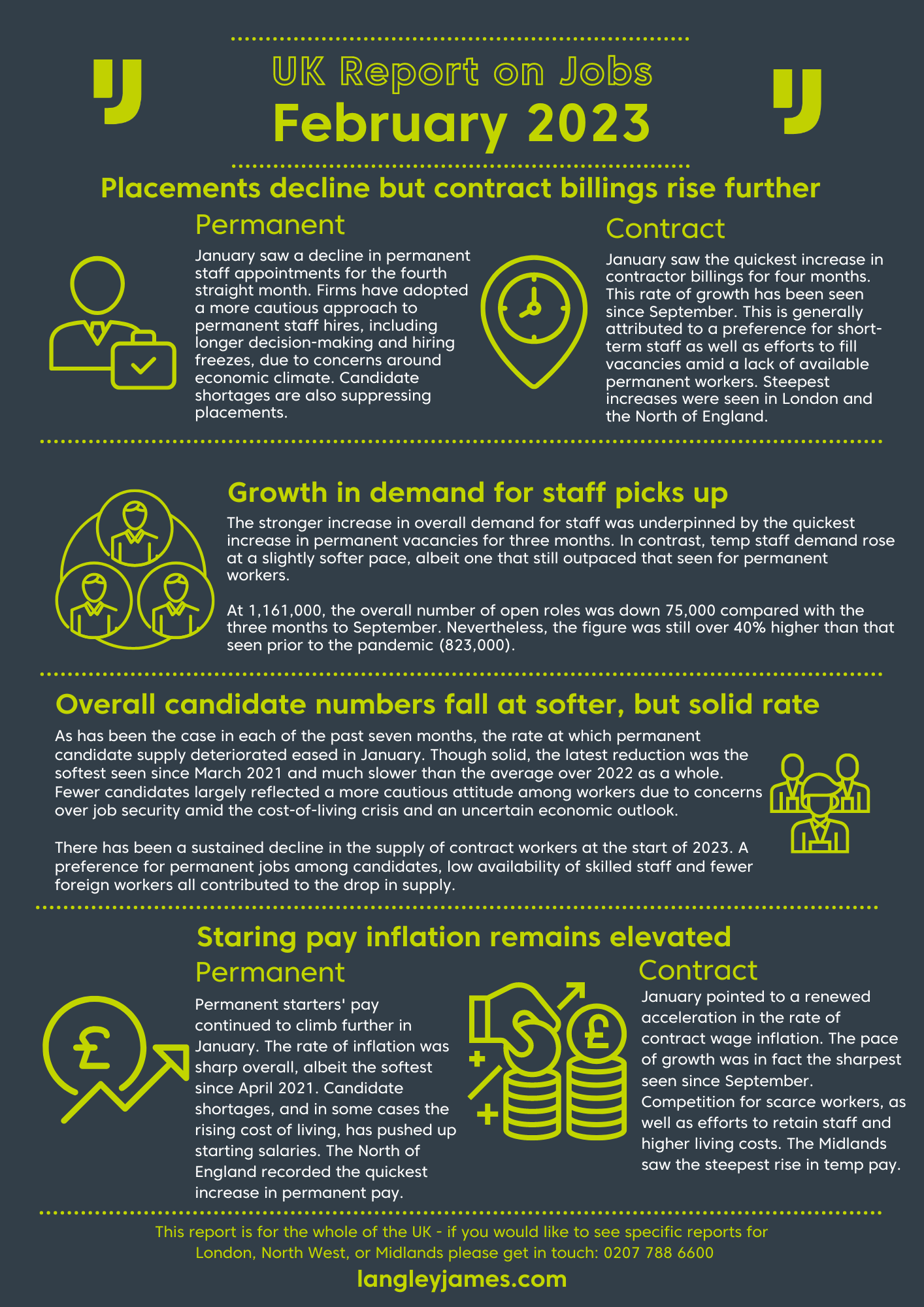

Jan 13, 2023 | Management, Tips
Remote working looks like it’s here to stay. Or some form of it at least. Employees now have the legal right to request flexible learning from day 1.
Some of the biggest challenges for employers managing remote teams, often for the first time, include workers struggling with loneliness, managing their time, and communication among staff members.
This can be tough. But finding a practical strategy that works can help.Here are a few points that some of our home-working managers have shared with us that might offer some much-needed wisdom!
Set clear expectations when remote working
Make no mistake, inexperienced remote workers were suddenly thrust into unfamiliar working environments. They’re daily routines all over the place. With that in mind, ensure you give your team crystal clear expectations of what you want them to achieve. Clear direction from you takes the pressure off them. It helps everyone to know what success looks like to you. It may be worthwhile weighting their job descriptions if the balance has shifted due to home working. This will help your team to understand what aspects of their role takes priority.
Treat homeworkers as though they were in the office
If your team were in the office, would they have regular access to you? If that is the case, things should not change for them when working from home.
At the start of working from home, you may have had to contact your staff on a regular basis. Mainly to avoid any feelings of loneliness/isolation, until things settled down. While you and your staff may be in the swing of things, it’s still extremely important that a clear line of communication is continued. You need to manage your staff as if they were in close proximity to you.
People need to feel part of the team, wherever they are working.
Remote working requires regular contact
We’re probably all sick of the thought of Zoom meetings (both in a professional and personal capacity), but truly, what would we do without it now?
We are lucky to have so many communication options available to us. Using video conferencing is a really inclusive way of holding a meeting. Microsoft 365’s Team, Zoom, and Google Meet amongst many others are great ways of very easily holding a face to face team meeting. Telephone Conference calls, Facetime and Skype are other ways to keep in touch when you can’t physically meet with your team. Whatever you choose, try to forge an inclusive contact plan that offers everyone consistency, routine and the chance to be heard.
Video-based coaching
Notice one of your team is not themselves? Follow up with a call and use Video-Based Coaching to help them. Regular contact will help you spot such issues. Working alone from home is not for everyone. For some, being alone all day is their idea of hell. While others are more than happy in their own company. Keep in mind that everyone tends to offer a brave face – be careful not to ignore the signs.
A particularly useful method we have employed here at Langley James is employing a ‘buddy-up’ system. This is where two employees maintain regular contact and catch-up with one another.

Monitor progress
Maintain focus by setting objectives. Use a progress monitoring system to keep people on track. It’s vital your team understands why you need to follow their progress to avoid feelings of distrust. Instead, this is about the business remaining on course for success. Helping you to foresee any issues, offer extra support or opportunities to improve the process.
Trust your team when they are remote working
You might feel unsure as to whether the work will get done to the same standard as if they were in the office. To cope with this, set up work-from-home guidelines. Things like emails must be responded to within 24 hours. Use text for urgent matters. No calls between certain hours. This helps to make sure teammates are not working around the clock. Set the rules and trust the team to follow them. If they don’t, it’s easy to refer to the rule and avoid conflict and negativity.
With this being said, the same rules apply for employees who are working overtime. Indeed, many employers are finding that their staff cannot switch ‘work mode’ off after hours. It’s hard when your computer is just sitting there. The temptation to answer emails and calls on a Sunday evening. It’s become a frequent occurrence for many of the working-from-home army in recent months.
It’s important to help ensure your staff avoid feelings of ‘burning out’ and ultimately ‘switching off’ when the day is done.
Make remote working feel inclusive
Ensure that any news in the business is always circulated to home workers. Ideally at the same time that the rest of the team . There is nothing quite as demotivating as finding out a business critical decision from someone else in the business. Frankly it just makes people feel second class.
Remember, the remote environment can have mental implications for many – with feelings of anxiety, stress and loneliness at its highest. This is only exacerbated by the rising cost-of-living, with many employees fearing that they may be made redundant. Remote working is likely to make staff overthink about their position within the company, so being as open and transparent as possible will be crucial for work productivity and morale.
Remember the company vision
Ensure that home workers still feel part of the overall company vision and how they fit in. To work productively people need to know that their efforts are contributing towards the overall goal. Any changes needs to be properly communicated to maintain motivation and focus.
Remote working needs reliable tools
Ensure your team has the tools to do the job. Broadband is absolutely critical for most of us however, connection reliability may be an issue, especially in more rural areas. Suggest alternative venues for employees struggling with this issue such as working with other colleagues, friends or family. Look for alternatives like Dongles, mobile phone hotspots, etc and try to offer solutions instead of problems for your staff to solve.
Create a Team-to-Manager and visa versa communication strategy
Managing a productive team remotely begins with a strategy for communication. Be aware of how disruptive ‘over-communication’ can be to your day. Set out a process so your team knows when it’s appropriate to call you. First, arrange for the appropriate number of weekly formal “report-ins.” Second, set guidelines about daily needs. Some people work better with a shopping list of questions and thoughts. Others like a trickle. An understanding of what is urgent will further mitigate inefficiency. This allows for ultimate productivity. Try asking team members to question “ Is it Urgent?” or can it wait. Encourage email or instant messages for less urgent issues. Reserving phone call interruptions for the meaningful stuff. That all said, be aware that some of your team may need reassurance or guidance to be productive so assess on a case by case basis.
Establish close bonds, help and support frequently
Empathise and appreciate your team member’s life by discussing family, commonalities and shared beliefs. Things they would normally discuss in the office with their colleagues. It’s worthwhile investing this time in getting to know them. Show you are supportive of their success by using inquiry to help them achieve their goals . Do this rather than just checking on their progress and numbers. Avoid closed questions like, have you done X?, or did you manage to call Y? You may have no idea what their day has been like. If something has interfered with the plan, the only answer they can give is negative. This can result in humiliation and defensive confrontation. Instead ask, What progress have you made on X? or, How’s your morning been? Qualify the situation first and then ask more detailed questions.
It’s important to share team success when remote working
Ensure that everyone gets to know about achievements. Make a real fuss. It will create a team feel good factor.
So, there you have it. Some really useful advice from people who’ve been through the highs and lows of remote working before.
Our expert IT recruitment consultants are here to take the pressure off you when recruiting someone new, permanent or contract. We liaise with candidates with the utmost care to ensure that their candidate experience is a positive one. Call us on 0207 788 6600 and let us help you Recruit Someone Worth Recruiting.

Jan 10, 2023 | IT, IT Market Reviews
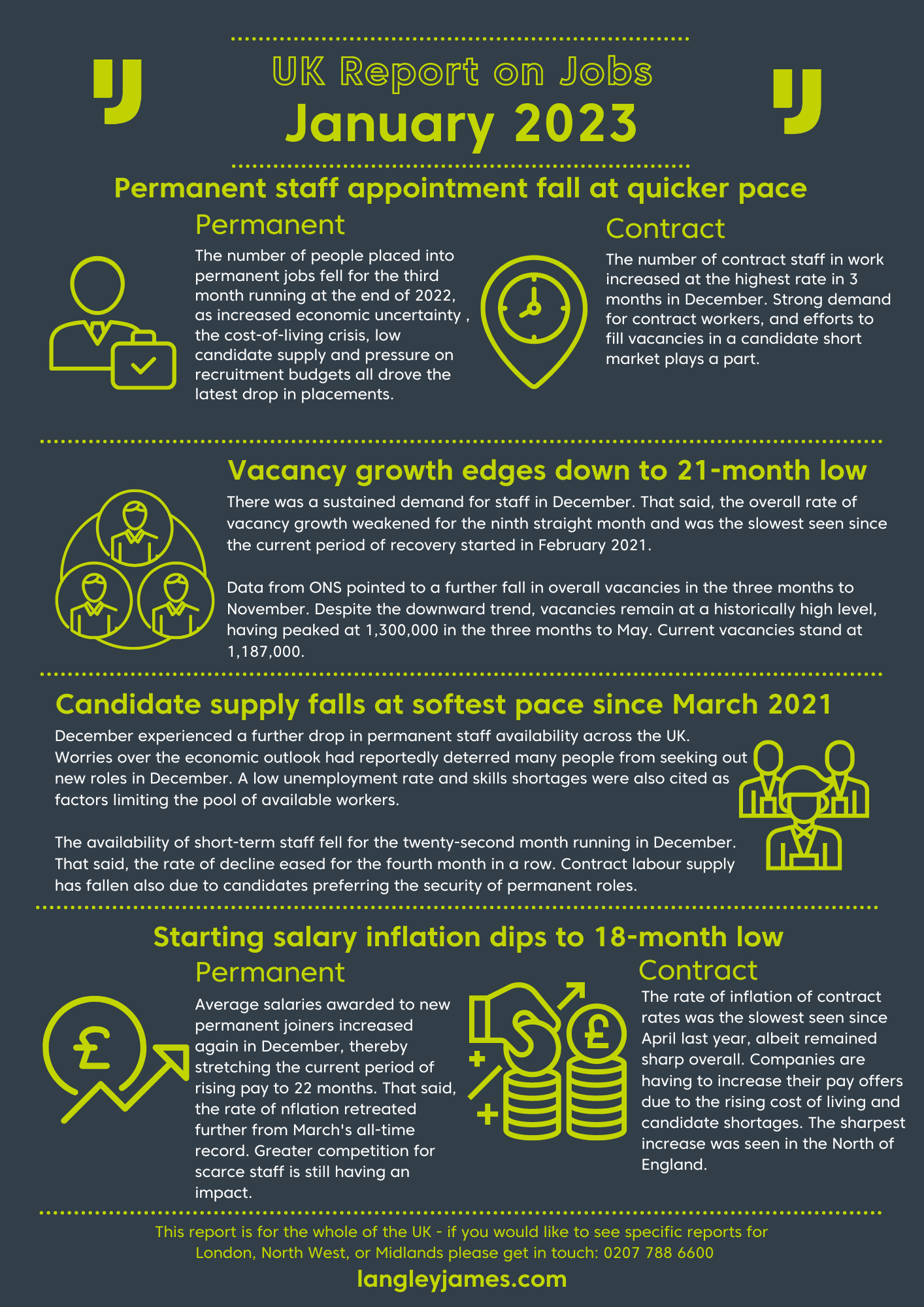

Jan 6, 2023 | IT, Tips
Have you considered your IT Recruitment Consultant to be part of your interview process?
This is the first stage of the interview process.
When you outsource your recruitment to Langley James IT Recruitment, you are outsourcing the early stages of your usual IT recruitment process.
Our Recruitment Consultants will act on your behalf. They will meet, interview and qualify candidates. that may be employed by your competitors in line with the job description you provide, We will make IT recruitment decisions based on the knowledge we have of your requirements. Our IT Recruitment Consultant will represent you and your company.
With that in mind, let us clarify how you can optimise this stage of recruitment to ensure your company is properly represented and your shortlist thoroughly vetted before you meet a single candidate.
Share your company knowledge with your IT Recruitment Consultant
If you attempted to recruit directly you might buy some recruitment advertising. Sift through the applicants and select a shortlist using your qualification information. Then, you would invite them to attend an interview where you would explore their suitability against your job description. You’d ask key questions and explain to them what the job is. If you like them, you will probably enthusiastically describe the business and all the reasons why they should join you as you have that knowledge.
Using Langley James IT Recruitment, you will save time. We will be responsible for most of the process allowing you to focus on other business challenges. The information you provide us with at this early stage is crucial to conduct your 1st stage interview to a standard that meets your own.
Qualification
Pass on all your early-stage qualification questions to your IT Recruitment Consultant. Provide examples of the best possible answers so they can match candidate responses accordingly. Context is important here as you might want specific experience and skill application. For example, when you say Advanced Excel skills, what does that really mean?
Describe examples of how the desired skill might be exercised so our Recruitment Consultants can explore a candidate’s experience with more confidence. Be very clear on what is essential and what is desirable so we can prioritise.

Your IT Recruitment Consultant is part of your team
By giving as much information as possible, it will help our Recruitment Consultants represent you and your company in the best possible way. Therefore, the more information we have, the more efficiently we can find you the right people.
Interview Feedback
Do you ensure that you gain feedback from our Recruitment Consultants before setting up your own interview, Part of our process is to produce a report when we shortlist. Ask for our interview report detailing the reasons why they feel a candidate is suitable. Review the evidence gained form the qualification questions you gave them and build their findings into your own interview plan.
Our IT Recruitment Partnership
At Langley James IT Recruitment we aim to keep in touch with you throughout the recruitment process. We send out a standard weekly report to update you on our progress – however do feel free to contact us at any time. We understand that things can change, and you may need to refine or change your recruitment priorities and regularly ask for feedback.
Sometimes roles are harder to fill if the salary is not sufficient, the location is non-traditional, or the specification does not sell the benefits of the role. Whatever the problem, do not wait to find out weeks later. Do whatever you can to influence the recruiter interview process and identify changes early.

Dec 8, 2022 | IT, IT Market Reviews
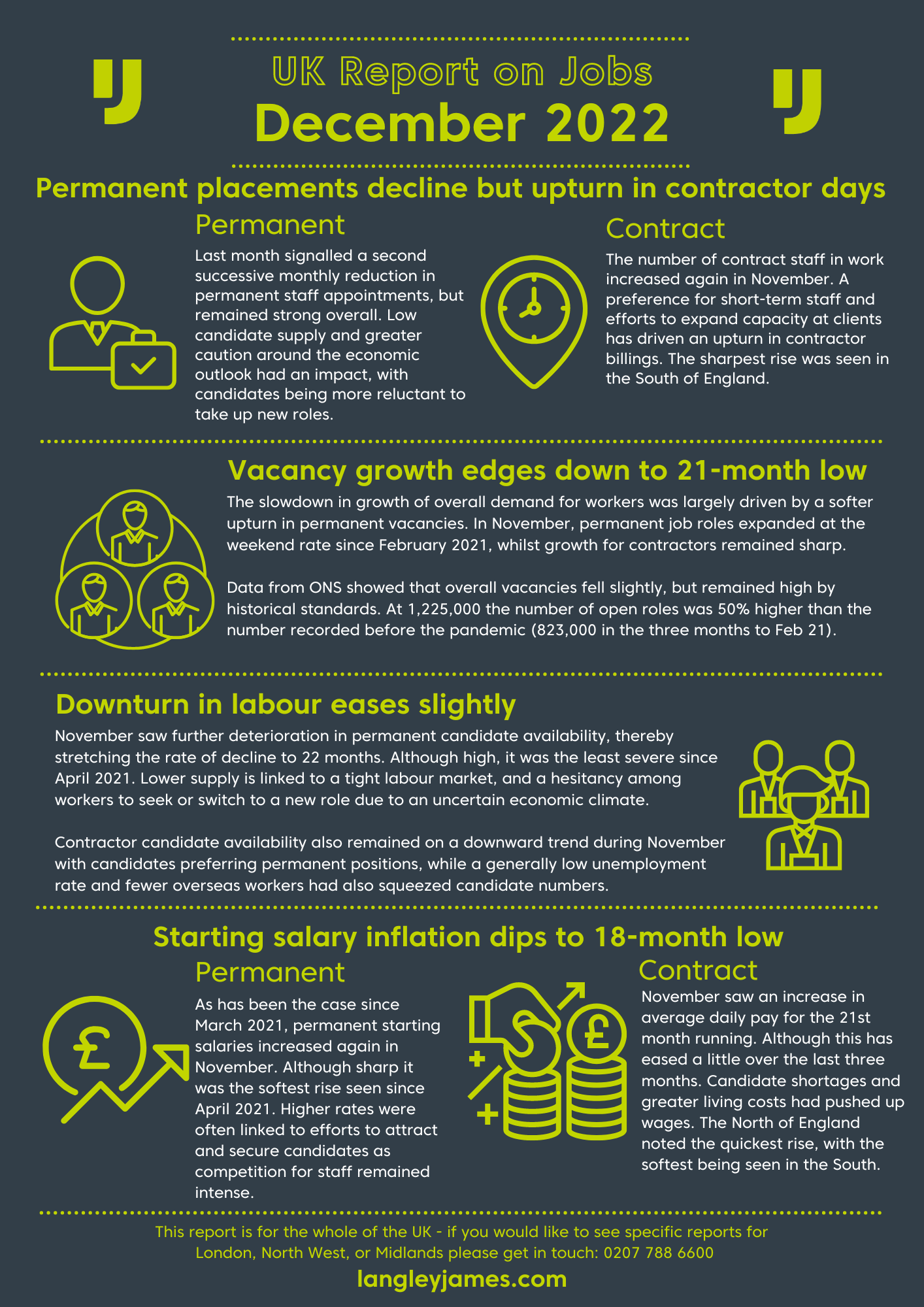

Dec 7, 2022 | IT, Tips
Should you recruit before Christmas? It’s a question, no doubt, on a lot of hiring managers’ minds right now. Do you wait until the New Year? Or do you go out to market now? Which is more likely to give you the best IT candidates?
You may think that candidates turn off in December. That they are focused on the festivities and waiting for the new year. new job bug. But is that right? Our consultants share their top 3 benefits of recruiting before Christmas.
There are more candidates to choose from
Yes, believe it or not, there are more candidates available in December for IT roles that we’ve seen over the last few months. We are speaking to candidates every day who are keen to secure their dream IT job before Christmas. They want to start 2023 with a renewed sense of excitement and a chance to make their mark in a new role. Read our 4 Tips on Hiring the Right Employee in IT for more tips.

Less competition if you recruit before Christmas
There’s a lot of excitement around Christmas this year after what the world has experienced over the last 18 months or so. And that can mean that whilst some companies are focused on Christmas Parties and festive celebrations, you can get ahead by continuing to recruit. Many companies press the pause button on hiring new employees over the Christmas period and postpone for the New Year. We take it they have little experience of the benefits of Christmas recruits! It can also mean that you don’t get caught into paying a higher salary than originally budgeted as candidates may not be in the process with as many companies. You can see the latest average salaries in our IT Salary Guides that we produce each month.
Start the New Year ahead
Waiting until January to recruit can mean that you are waiting until March for someone new to start! The first week of January isn’t the best time to be advertising a new job. It takes the nation a couple of weeks to get back into the pre-Christmas flow of things. That means that you’re not likely to be making offers until the end of January and with 1 month notice, this takes you to March. Why wait? By recruiting now, you can interview and offer before Christmas meaning your new starter can be with you before January is out.
Here’s where we can offer a helping hand to help you recruit before Christmas….
We understand that you may be busy finishing off projects for the year, and recruitment may not be in your plans. However, we can do the hard work for you and find high calibre candidates ideal for your workplace. Share your IT vacancies with us and will find the very best candidates for you. We will supply a shortlist of exceptional candidates that are all ready for interview.
Christmas is the time of giving, and we are ready to help both candidates and clients with their IT recruitment needs!

Nov 25, 2022 | IT, Tips
As we approach the end of November, there’s no getting away from the fact that Christmas is just around the corner. And after a couple of years of false starts, this year is set to be a big celebration. With many houses already proudly displaying their Christmas trees and Christmas lights being switched on around the country, it really is beginning to look a lot like Christmas!
But how does Christmas impact your business? And more importantly, are you ready? We share our top tips to prepare your business for the build-up to Christmas.
Covering Leave
It’s inevitable that employees will want to take leave this time of year. And after the last two years, employees may be keen to use their rolled-over holiday this year. If it’s typically a quiet time of year for your business this shouldn’t be too much of an issue. However, it’s all in the planning. Encourage employees to book their leave in advance. And, introduce a deadline for booking Christmas leave. This is one way to make sure leave is fair and you have time to arrange cover if needed.
If cover for certain roles is essential organise this as far in advance as possible. It’s the most sensible approach. Outside cover could be tricky to find at short notice, not to mention expensive. Drafting in current employees to cover extra tasks could be the best solution. But you’ll need to have arrangements and procedures in place in advance to make sure workload is fair and achievable. Christmas bonuses or prizes could be on offer to incentivise extra work over the Christmas period.
We’ve been supplying IT contractors to business across the UK for over 20 years. If you would like to talk to us about Christmas cover, get in touch with our team today.
Office Christmas Party Issues
Christmas parties can be great fun. However, they also create a melting pot of different personalities, built up workplace tensions and alcohol. All of which sometimes leads to trouble! Choosing and deciding on the venue and the type of event is the first hurdle. Keeping everyone happy, especially when there is a mixture of personalities and age groups isn’t always easy. Try a vote on a range of options or try a ‘two phase’ event. Perhaps with a Christmas lunch for everyone followed by drinks and some dancing for anyone who wants to keep the party going.

Having your Christmas party offsite is the best idea so any potential problems don’t occur on your business property. If you’re hiring out a venue, hiring caterers or entertainers make sure these are booked in early and that you have everything confirmed in writing or a contract. If you feel it’s necessary you could always update your employee handbook and send out a copy of the general code of conduct prior to the event, to cover anyone who’s likely to be caught near a photocopier or under the mistletoe!
A Change of Pace at Christmas
Unless your business is retail where the pace gets a lot quicker this time of year, the lead up to Christmas usually sees things winding down in the office. To avoid boredom or wasted time, use any spare time wisely. Have your employees clear out old files, organise databases and folders and get those jobs done that just keep falling off the to do list. These kind of tasks can be mundane, so add some festive spice to boring chores and offer rewards. Hold Christmas raffles, quizzes or advent calendars to brighten things up and boost motivation.
Snow Days
Do you have a winter weather policy? If the weather is really bad, do your employees know what the correct protocol is? The procedures should be emailed around at this time of year so everyone is clear on what to do. If a cold spell is forecast consider a plan for phone lines going down, pipes freezing up and transport being disrupted.
Planning is the key to most issues you’ll face this winter, and anytime in fact. Trying to foresee any potential issues will help things run smoothly. If you’d like help or advice with you staffing over the Christmas period you can get in touch with us here.
Using Langley James to hire an IT contractor this Christmas
We can supply you with an expert IT contractor, within budget, to carry out your project to a strict timeframe. Giving you peace of mind by knowing the exact cost of the project from the outset. And allowing day to day IT operations to carry on as seamlessly as possible.
Let us find you an expert IT Contractor who not only has the t-shirt but is going back to remake the film. Now is a great time to get on with those projects that have been hanging around and getting specialist contractors has never been cheaper than it is now. You can buy in an expert who can turn a project around to a set schedule and budget.
We have been recruiting IT contractors and permanent IT staff since 1999. We have an extensive network of experienced contractors as result. Get in touch with our expert team today to find out more about hiring an IT contractor today.

Nov 10, 2022 | IT, IT Market Reviews
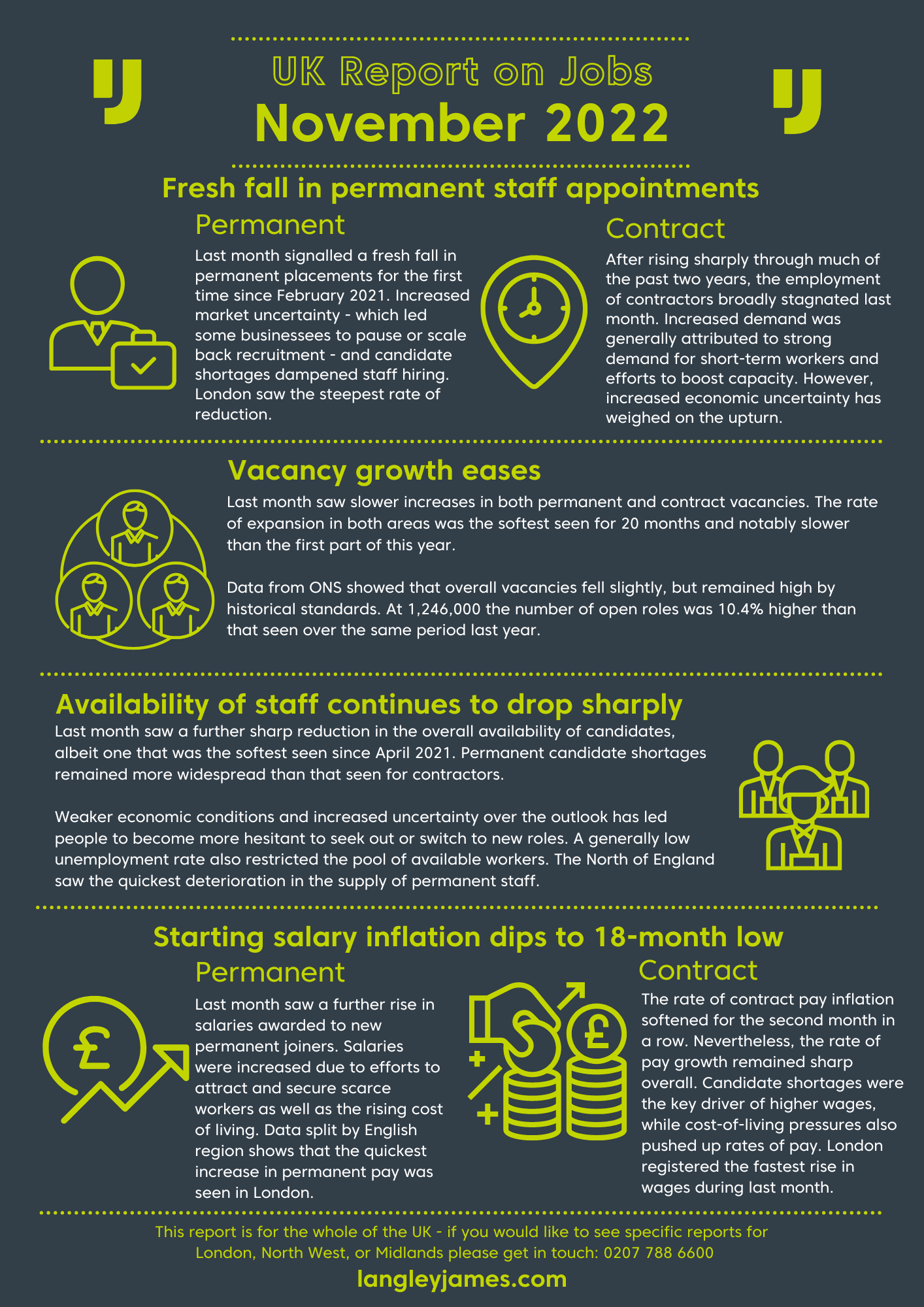

Oct 28, 2022 | IT, Tips
Technical tests are often used in IT recruitment. Technical testing can provide a far greater insight into how the potential employee will perform in your role. Interviewing on gut feeling is not right, and tests can assist in confirming or rejecting those “nice people” that are professional interviewees. Remember, most people have been an interviewee far more than an interviewer! But are your tests preventing you from securing great candidates?
What do technical tests entail?
Technical tests are a more practical way of interviewing a candidate. They are used in order to assess technical ability and knowledge required to be able to fulfil the role. Depending on the technical skills that are required for the role, technical testing methods will vary. Technical tests are a great idea to help your interview process. You can download a multitude of tests to suit your need. There are free ones and there are ones you can pay a fee for. It’s an industry all on its own and some people and companies are making a great living from it, so they must be worthwhile.
Not all questions administered to the candidate are aimed towards testing technical knowledge and ability. Often technical tests also test problem solving skills, personal skills, communication skills and even how their thought process is constructed.
You may already be testing IT candidates as part of your recruitment process. But are your tests right? What are you testing for? Don’t just test for testings sake! Make it a valuable part of your decision making.
How to test more effectively
The best technical tests in our experience are written by someone who knows the role you are recruiting. A person who understands all the necessary technical skills to be a success. But not only this, they will also be able to identify any transferable skills. By testing in this way, you may get a better chance to secure the best person for your role. Testing in this way can help identify those that will perform well at the role, even if they don’t have the tech skills that are on your list.
When using an ‘off-the-shelf’ technical test, you’ll find that some of the questions are not relevant to your role. Whilst they may be valid technical questions, not all will be suitable. This is the feedback we have had from candidates. And in some instances, the suitability of the technical test has even discouraged them from taking the role.
So in short make sure your technical test is relevant to the role you are recruiting, otherwise you may be losing out on some great candidates. However, it’s also important to ask the right questions in interview to help determine someone’s technical ability.

What should technical interview questions entail?
To be able to make a fair decision about the ability of the candidate to perform in the role, it is vital to ensure the questions you ask the candidate will reveal certain key attributes.
Our advice is to ask questions that will:
- Relate to the company’s technical activities and demonstrate a candidate’s knowledge and experience in these activities
- Demonstrate a candidate’s ability to complete technical activities that are required as part of the role
- Demonstrate the candidate’s previous experience, knowledge, or education in a particular field
- Require the candidate to demonstrate their problem-solving skills. This can be done by administering a case study that explains an issue the candidate may come across as part of the role and assessing how they solve the issue and comes to a conclusion.
Are technical tests worth doing?
All in all, technical tests are a great method to use to interview a candidate. They can reveal a lot about the individual’s ability to undertake the role they have applied for. But as well as technical testing, be sure to get to know the candidate on a more personal level to ensure they will be a good fit for your company.
Another key point to remember is to make sure that your testing doesn’t cause delays to the interview process. In the current market it’s important to make sure your process can be quick to secure the best candidates. You may find our blog 3 Simple Ways to Speed Up Your Hiring Process an interesting read.
The interview process can be a stressful time for both the candidate and the interviewee. If you need help recruiting the best IT professionals, our expert consultants are on hand to help you at every step of the recruitment process. Call us on 0207 788 6600.

Oct 7, 2022 | IT, IT Market Reviews
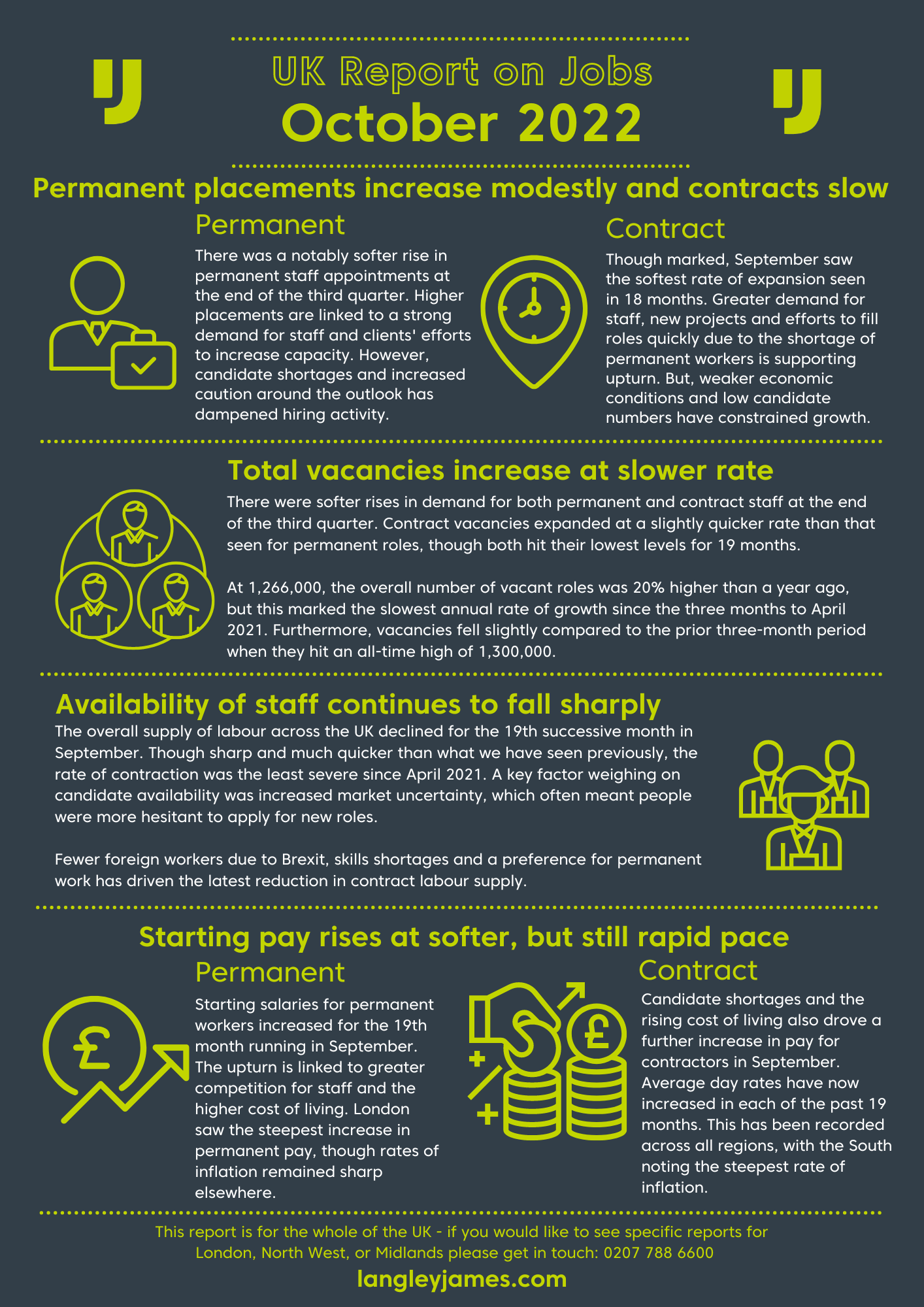

Sep 25, 2022 | IT, Tips
‘Quiet firing’ – are you guilty of it? Could it be the cause of your recent resignations? The internet is currently awash with people talking about quiet quitting. This is when an employee literally does the bare minimum to get by without losing their job. It’s become a common issue of late, especially with companies embracing flexible working. But, it can actually go both ways.
What is ‘quiet firing’?
‘Quiet firing’ isn’t actually a new thing. It’s been happening for years. Going unreported and simply being part of the employment landscape. But now it has a name and people are starting to talk about it. Maybe it’s happened to you and you just didn’t realise? ‘Quiet firing’ is essentially when a manager demoralises their employees enough, that they choose to leave. Sometimes, it’s not intentional. And other times, it most certainly is.
When was the last time you took a step back and looked at your current management practices? If, like many other companies, you have gone from managing an on-site team, to managing a part or fully remote team, your management practice has had to change. Even if you haven’t made this transition, there are other issues afoot. With the cost of living incase and desire for career progression, employees are looking for more support than ever from their manager.
Are you guilty of ‘quiet firing’?
This can happen in various ways, such as increasing worlds to unmanageable levels, not responding to requests for promotions or salary increases, or by eliminating opportunities for career growth. But that’s not all. Micromanaging, excluding employees, cutting back hours, or removing soft benefits. All the things will make an employee feel unwanted, under-valued and neglected. And with so many vacancies in the market right now, candidates are in a strong position when it comes to finding a new job.

We encourage companies to look at their management practices and identify any instances of ‘quiet firing’ by poor managers. These are the managers who do not want to invest the time and effort to support, motivate and engage their teams. And sometimes this isn’t intentional. There are time pressures on managers across all areas of IT. It could be that the manager just simply doesn’t have the time to really consider the wellbeing of their team. These trends are causing concern for HR teams who are trying to recruit and retain talent in a tight job market.
Avoiding “quiet quitting’
Interestingly, there is a distinct connection between ‘quiet firing’ and ‘quiet quitting’. If there are members of your team who used to do well but are now showing signs of doing as little as possible, ask yourself this. Why? What is it that has made them feel so disengaged that they have lost to desire to do their very best? People don’t leave jobs that they feel supported in. Jobs that pay sensible salaries, a work-life balance and offer opportunities for career progression.
This year has seen a 24% increase in internet searches for “how to fire someone” compared to last year! And, as much as a 180% increase in the term “when to fire someone”. And with the current skills shortage, it’s surprising to see these increases.
Stop quiet firing, and you’ll avoid quiet quitting!
About Langley James
We have been helping companies to attract and retain the very best IT talent since 1999. But we don’t just simply find the best candidates. We can advise you on the current jobs market conditions. Share data on average IT salaries. Talk to you about the benefits that candidates are looking for. In fact, we do everything we can to help ensure that you get the very best people for your team. Get in touch with our team to find out how we can help you to recruit the best!

Sep 13, 2022 | IT, IT Market Reviews
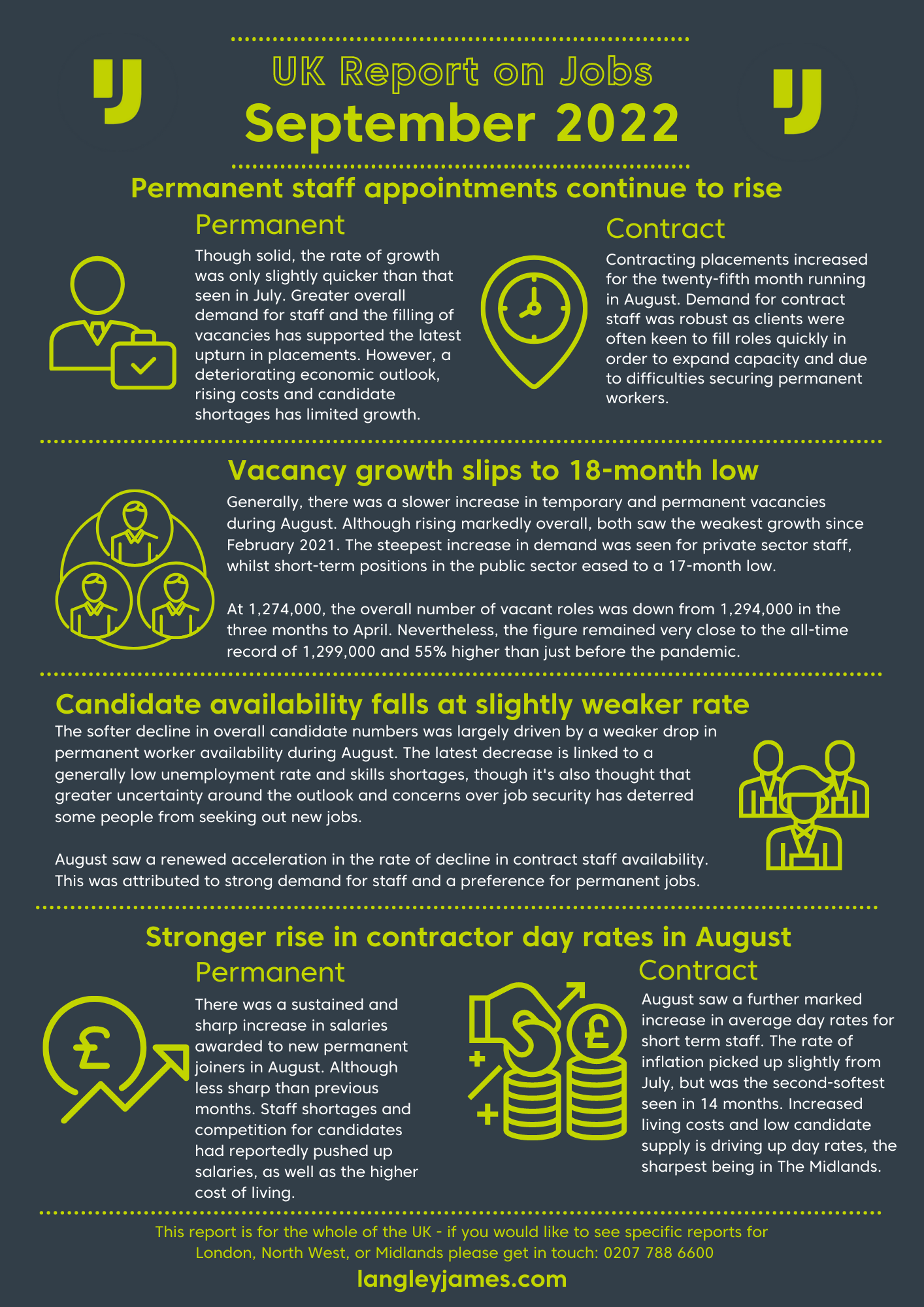

Aug 8, 2022 | Hiring Resources, IT
When it comes to writing an IT job description, it’s important to follow a few ground rules.
Not only should each employee have a clear job description as part of the HR process, crafting the perfect job description can actually help you to secure the best talent. But it’s not just that! A poor job description, or none at all could actually be preventing you from hiring the best IT talent.
Here’s our top tips to make your next IT job description the best yet.
Job title – stay away from buzzwords
Ensure that you keep your job title simple by using keywords that accurately describe the role. Keep away from using complicated jargon. For example, stick to using standard experience levels such as ‘senior’ rather that ‘VI’. Whilst it’s important to stand out when recruiting, keep the job description as factual as possible to avoid room for confusion.
To begin with, focus on the job title. A job title is the start of the process and will be used to advertise your role. Consider the level of expertise you want for the job, not just the role itself. If you are looking for a 2nd Line Support engineer, but the experience you need is more Systems Analyst, you’ll need to remember that the job title may put some people off. It’s the age of LinkedIn and people are proud of their achievements and their career. Do bare this in mind when writing your job description.
Job summary – the start of an IT job description
Standing out in a crowded market can be hard. The demand for talent for IT jobs is rising each month. Begin by capturing a candidate’s attention with a short and engaging summary. This should include the expectations of the role and a brief overview of your company. Why are you unique and why is working for you such a fantastic opportunity? Think of the job description as another step in the journey. Remember that it’s usually what a candidate sees before they come for an interview. Don’t lose their interest at this stage. Remember to still sell the opportunity!
Here’s a top tip to help you stand out –
In the current market more and more that candidates are looking to give something back and this could be your chance to shine. Ask yourself ‘How does this role contribute to making people’s lives better, or solve existing problems?’ then fill in the blank – ‘come and join a team dedicated to…..’ You may be surprised how effective this can be.

Include clear responsibilities and duties for your job
Less is most definitely more! Whilst you want to clearly define the main responsibilities of the position, make them detailed yet concise. If there is a lot of responsibilities with the role, why not group them into categories? This will make them much easier to read and absorb.
It’s also important to think long-term too. We advise thinking about how this position will contribute to the goals and business objectives of the company. Is there the potential for advancement for candidates? By presenting the whole opportunity, you will attract the best candidates.
Refresh often
When you look to hire, do you go to HR and dust off that old job description again? Has the experience needed changed? Is the culture different now? It’s important to make sure that you review and even re-write your job descriptions regularly. Make sure that it is still fit for purpose!
One of the things that has changed for most companies is flexibility with working from home. In fact, there was an article in The Times yesterday (15.08) that showed how software engineers in particular we in control of working arrangements due to the candidate shortage. If you have a work from home policy, it’s important to include reference to this in the job description.
TOP TIP: – get your employees involved when writing your job description! No one knows the job better than those that already do it.
Things to avoid when writing your IT job description
- Discrimination – Be aware of unconscious bias’s
- Asking too much – Unrealistic expectations could prevent star candidates from applying
- Negativity – Be sure to write the description in a positive tone
- Forgetting about structure – Make the job description easy to read. Bullet points are always a good idea!
- Being mysterious – Be intriguing without holding back crucial information
- Mistakes – Check and check again for mistakes. Candidates will be quick to judge if there are spelling mistakes!
Following these 5 steps to writing a fabulous job description could help you secure your ideal IT candidate.
If you are looking for experienced IT experts for your business, whether permanent or contract get in touch with the team at Langley James today!

Aug 5, 2022 | IT, IT Market Reviews
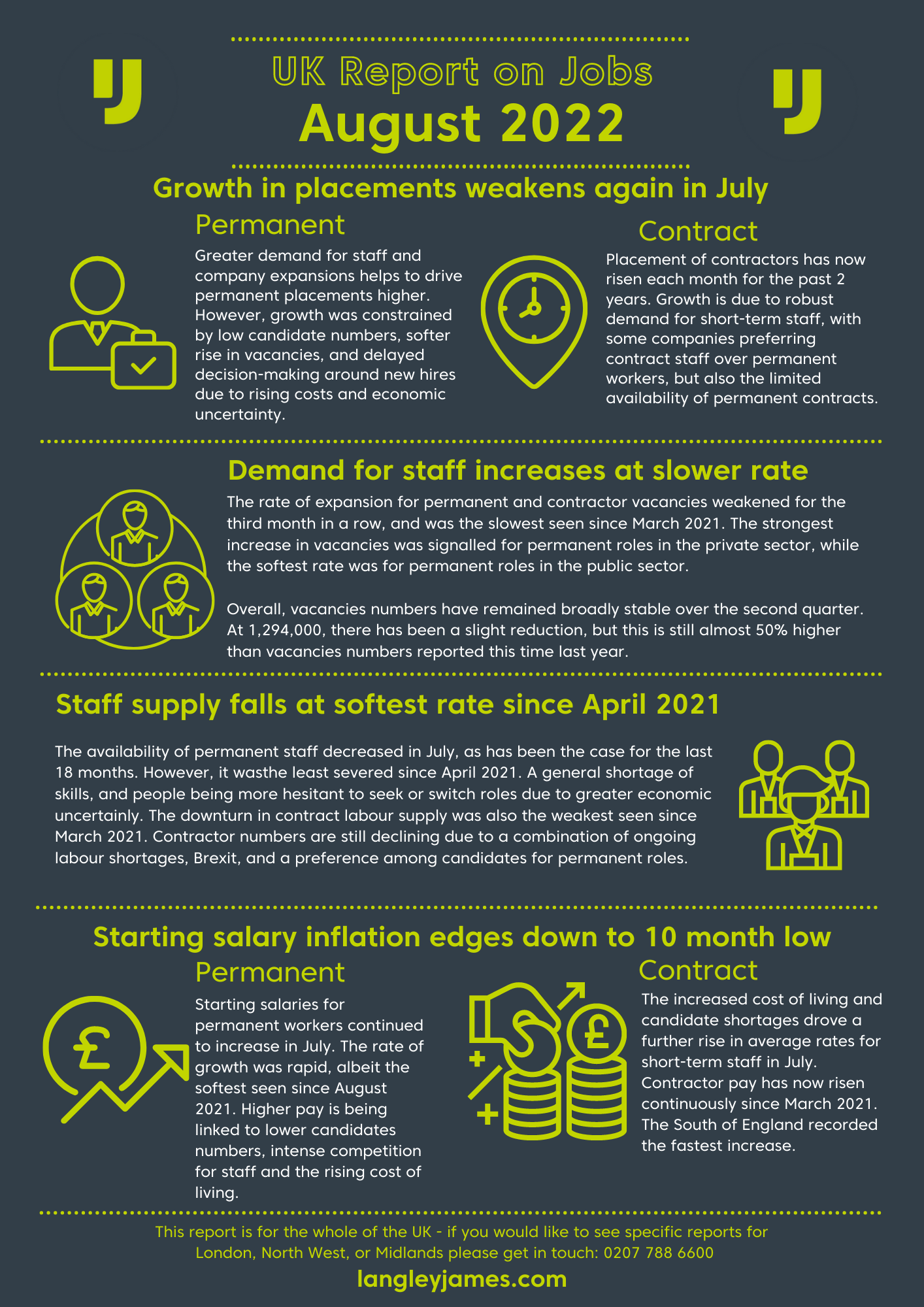

Jul 20, 2022 | Hiring Resources, IT, Tips
When it comes to attracting candidates, the benefits of offering hybrid working are something you should still consider. As yourself, is it necessary to have your team on site for 5 days? We appreciate that some roles in IT are hard to perform remotely. However, it still seems that most candidates are looking for flexibility and some form of hybrid working.
We’ve all been experienced the benefits of working from home. Saving money and time on commuting, having a better work / life balance. There are many great things about being able to work flexibly. But what about the benefits to you, the employer? What have you got to gain from offering hybrid working? Our expert recruiters share their insight.
Larger pool of candidates
We are living in a time where there is a real shortage of skilled candidates. With vacancies over 1m in the UK and unemployment figures low, it’s getting harder to find the best IT talent. However, if you can offer remote working, your candidate pool suddenly becomes the whole of the UK, or even the World! Think of the diversity this could bring to your team. And the greater availability of exceptional candidates for your IT vacancy.
Improved loyalty is one of the benefits of offering hybrid working
According to various reports, we are in the middle of The Great Resignation. Around the world, workers are quitting their jobs in record numbers – and bosses are still scrambling to figure out how to keep them. However, offering hybrid working can help combat this. Lots of people were working from home during lockdown and let’s be honest, we all got rather used to it. Companies adapted and in most cases, business continued as normal.

But now that we are back in the office, the promise of flexible working is slowly disappearing. But candidates are looking for flexibility. Therefore, if you are genuinely able to offer hybrid, flexible or remote working, you should have a larger pool of candidates to choose from. Plus, if you continue with flexible working, employees are likely to stay with you for longer. Why would they move for another job if it meant going back to an offer 5 days a week?
It focuses on mental wellbeing
Mental wellbeing has been big news recently. There’s a renewed focus on the mental health of our teams. And companies who have a wellbeing policy are more likely to attract more candidates. By offering flexibility in working patterns, or work locations, you will be seen as a company who looks after their employees. It also shows that you have trust in your teams, and this can go a long way.
Are you recruiting?
If you are currently recruiting in IT, you’ve no doubt noticed the huge reduction in applications. That’s where we can come in. We’ve been recruiting IT candidates for over 20 years and have a large database of highly skilled IT candidates. Even in the skills shortage, we are still able to secure exceptional levels of IT talent for our clients. We’d love the opportunity to do the same for you. Get in touch with our team today and see how we can help you to recruit someone worth recruiting.

Jul 10, 2022 | IT, IT Market Reviews
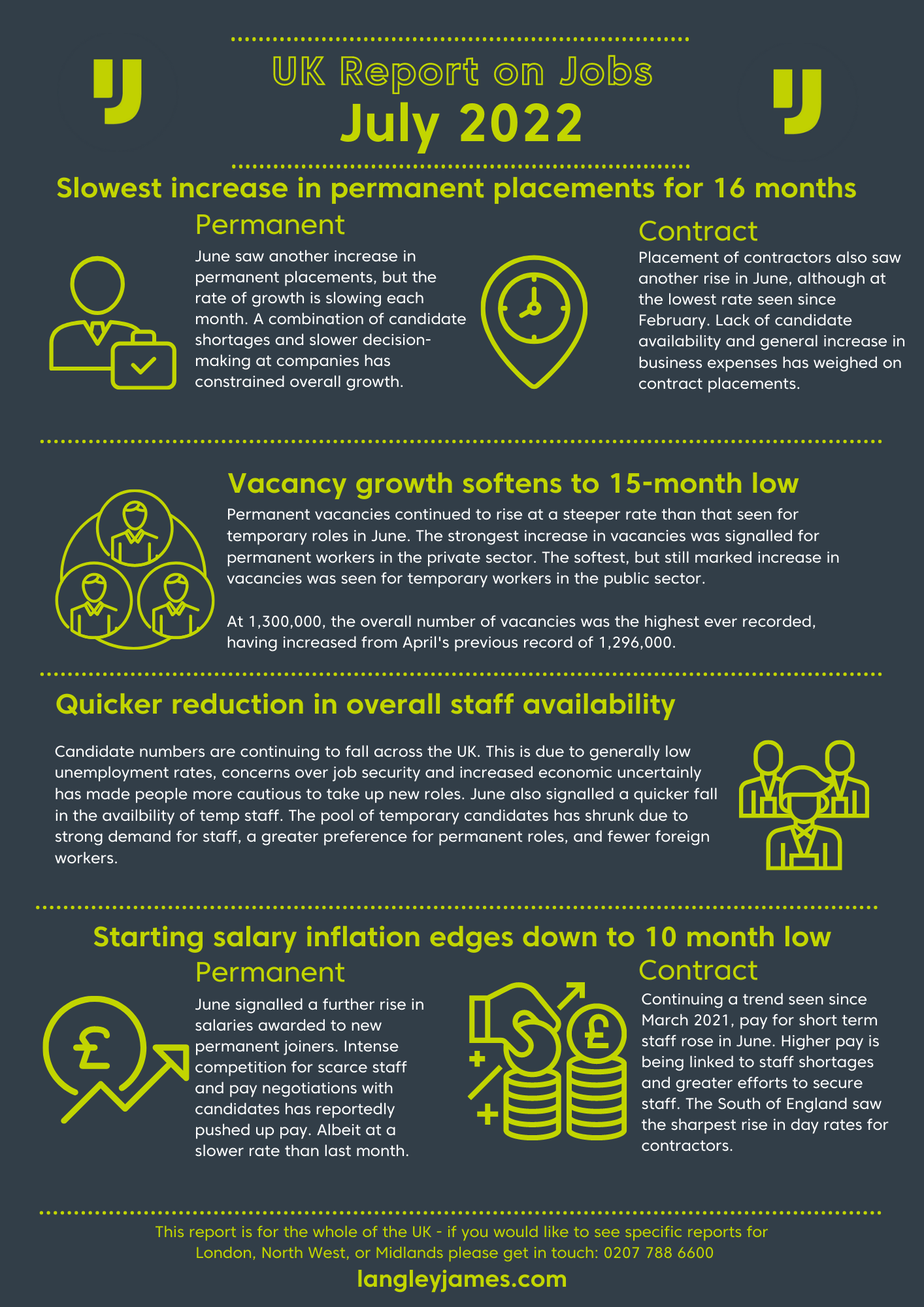

Jul 9, 2022 | Hiring Resources, IT
IT salaries seem like they are on an ever-increasing trajectory. With the demand for staff higher than ever before, and the candidate pool shrinking by the day, it’s no surprise. But what does this actually mean for salaries?
We regularly review the average salaries for the most popular jobs in IT. And we always give an indication if it’s up or down from the previous month. But it’s when you look over a longer period that you really get to see the bigger picture. Some will have you believe that salaries have increased dramatically across the board. This is not the case. Yes, it’s true that some salaries have seen as much as 96% increases. However, there are some areas of IT where salaries have remained broadly the same.
So, we’ve taken a look through the archives to give you a bigger picture view of IT salaries over the last 2 years.
Senior IT leadership roles that saw the biggest increase in IT salaries
There’s no doubt that it’s at the top end of the scale where we’ve seen tha largest jumps in average pay. In September 2020, the average salary for a CTO was £100k. And in our most recent salary survey (July 22), that’s increased to £144k. An easy % increase to work out there! And it’s a similar story for an IT Director. £112k in September 2020 to £150k in July 2022. A 34% increase. And a Head of IT too. £77k in 2020, £90k today. So, if you are looking to hire into your senior IT leadership team, it’s safe to say you’ll have to offer a lot more to attract the best than you did 2 years ago.
Trends that have helped increase average salaries in IT
The world of business has experienced many changes over the last 2 years. The pandemic meant that some business really had to fast track future plans. And this is reflected in the average IT salaries for those jobs most in demand to operate in this new normal. The step change growth in e-commerce when we were all confined to our homes has had a dramatic impact on salaries in this specialism. In September 2020, the average salary for an e-commerce manager was £65k. You’d now have to pay around £84k to secure the same talent.
But it’s not just e-commerce. Business are relying more heavily on data than ever before. Data driven insights have become an essential part of business success. And this is where we reveal the IT role that has seen the largest increase in average salary. A database manager would earn an average salary of just £50k in September 2020. This is now a much larger sum of £96k. That’s a 92% increase!

IT salaries that have remained more static
Whilst all areas of IT have experienced some increase in average salaries. Some have seen little change. However, before we share this information with you, it’s important to consider that these are the average salaries on offer. An overview of the jobs market and demand for candidates. The skills shortage does mean that starting salaries are often higher than that advertised. Take a look at our most recent report on jobs to see the trends.
When researching the change in salaries, we noticed that it’s the less senior roles that haven’t seen too much change. For example, a 1st Line Support role was £28k in 2020. And that figure remains the same today. And it’s a similar story with 2nd line. £35k in 2020 and £26k today. It’s 3rd line that has seen the largest increase in the support specialism. An increase of 9% from £36k in 2020 to £51k in 2022.
Want to know more?
We’ve been recruiting IT candidates since 1999. And we’ve seen a lot of agencies come and go during this time. It’s not enough for an IT recruitment agency to simply advertise your job and share the best applications with you. You could do that yourself! Admittedly, there would be a cost to advertise the roles that could end up costing a lot more than a recruitment fee, but the choice is still there.
At Langley James, we are experts at what we do. Our pure passion for all things IT is seen throughout our exceptional service levels. We work on all our clients’ vacancies as if they were our own. And this is where our market research comes in. We know the market. We know the trends, the average salaries and more. And we make sure that we share this with all our clients to enable them to recruit someone worth recruiting.
Get in touch with our team today to see how we can help with your IT vacancies.

Jun 28, 2022 | Hiring Resources, Tips
Your IT hiring process, if lengthy, may be preventing you from securing the best staff. Whilst we’ve always recommended working quickly when it comes to recruitment, it’s now more important than ever. The market is like we’ve never seen it before. And we’ve been doing this for well over 20 years.
There’s something in common with the companies who are still able to recruit great IT staff in 2022. Their IT hiring process. Our team share their insights on how to speed up your IT hiring process. We’ve taken best practice and combined it with what’s working in the real world.
Follow our advice and you can ‘recruit someone worth recruiting’.
Start your IT hiring process with a great job spec
Job specs used to simply be a long list of expectations and demands. If yours are still like this, then it’s time for a change! Yes, it’s still important to have a list of desired skills and experience. However, it’s how, and where these are listed in your spec. The best specs when it comes to attracting candidates all follow a similar structure.
Start with details about the company. What is it that makes you attractive to a potential employee? When it comes to IT hiring, candidates are most interested in technology, upcoming projects and more. But don’t forget the bigger picture too. A lot of candidates, particularly generation z are looking for purpose to their roles. A purpose doesn’t have to be saving the planet or ending world hunger. A purpose can be something as simple as making life a little easier for a certain group of people. Think about your company’s purpose and highlight this in your spec. Or failing that, what about your values? If you have clearly defined values, sharing the in a job spec will help you to attract candidates who share the same values.
It’s also key to highlight the benefits in a job spec. Dedicate an entire section to all the benefits on offer for the role. Whether hard or soft benefits, showing them in a spec will again help to attract more candidates.
Getting your job spec right will undoubtably speed up your IT hiring process.
Engage a specialist IT recruiter
We’ve written many times about the benefit of working with a specialist IT recruiter. With a market like it is, it’s not as easy as it used to be to recruit, Job adverts aren’t working as well as they did and it’s a specialist recruiters’ network that the candidates are now coming from. Be sure to choose carefully. But getting it right will most definitely speed up your IT hiring process.

Getting from CV to offer
This is the most crucial part. You need to be able to react quickly to a CV. Don’t want until you have 5-6 CVs to sift through. Doing this will mean that you are likely to lose your element of choice. If you receive a CV from someone who has the skills and experience you need, interview them ASAP! And by ASAP, we really do mean 24 hours if possible. Now that 98% of 1st and 2nd stage interviews are held via Teams or Zoom, it easier than ever to be quick.
Then, should you like the candidate after the 1st interview, get them booked in for the next stage within 2-3 days. Again, this can be remote if it makes things easier. If after that stage, you are wanting to make an offer. Invite the candidate into the office. Again, do this within 24 hours if possible. If this isn’t possible then we strongly advise to get the offer out with 24 hours to start the ball rolling.
How Langley James can help speed up your IT hiring process
We are not ‘yes men or women’. We are here to make sure that you get to meet the best possible IT candidates for your role. We will advise you on the things you need to do to achieve this. We want you to be successful when it comes to hiring in IT and we will do everything possible to help you. Wouldn’t you want to work with an agency like that? Get in touch with our expert team today and experience the difference of working with a true specialist.

Jun 13, 2022 | IT, IT Market Reviews
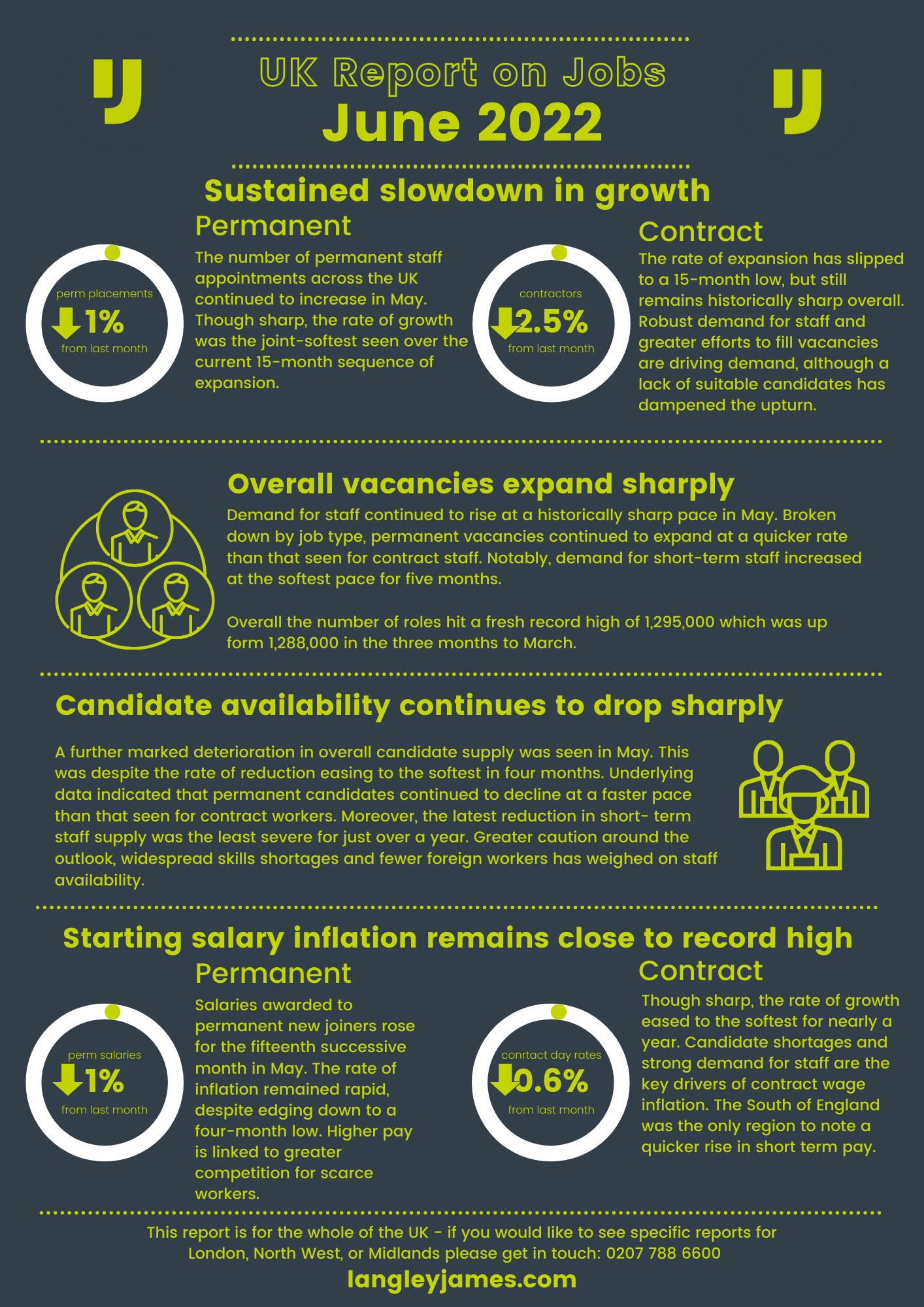

Jun 10, 2022 | IT, Tips
The Great Resignation is well and truly here! According to a recent survey conducted by PwC, 18% of workers cited that they are “very or extremely likely” to change jobs within the year. Plus a further 32% saying they were “moderately or slightly” like to move on. So, what’s causing this great revolt? It’s not just driven by pay, despite this being one big reason due to the cost-of-living crisis. In fact, the PwC study also found that 72% of UK workers are planning to ask for a pay rise in the next 12 months. But another important factor is job satisfaction that now scores high on an IT candidates wish list.
So, let’s look at what you can do to survive the great resignation in your company –
Review your salaries
There’s no getting away from the fact that it’s costing more to get to work than ever before. The cost-of-living is increasing at an alarming rate and people are looking for ways to cope. By reviewing your salaries across the board, you may be able to secure more staff. Get your teams together and ask about their concerns about the cost-of-living crisis. Taking a proactive approach in this situation may create more loyalty from your team. Also – acting early may mean that you actually save money. The increases we are experiencing are not likely to go away for a while. In fact, it’s more likely that they will continue to increase. It’s possible that your team will expect a more significant pay rise the later in the year you deal with it. It’s certainly something to consider.
If you are looking for guidance on salaries, we can help. Each month we produce an IT Salary Guide that shows you the latest average salaries for the most popular jobs in IT.
Look at your company culture
Was your company culture affected during lockdown? What steps did you take to ensure that the culture was still attractive to your teams? There have been some significant changes to the way we work together. By speaking to your teams and listening to what they have to say about the culture, you could save yourself having to replace as many people. What does your team want? Don’t assume! There’s no getting away from the fact that creating a culture in the world of hybrid working isn’t an easy task. But getting it right can make all the difference.

Flexibility can help you through the great resignation
Right now, around two-thirds of people are working remotely. This is either on a full-time or part-time basis. But it’s important to remember that offering remote working isn’t essential to a happy IT team. Flexibility is the key. Everyone will have different needs and it’s important to meet these where you can. It may be that you are more flexible with the working hours. This is particularly helpful to staff with children. Allowing later starts, or even giving time off for the school pickup, for additional hours to be completed from home. These things can make a big different to retaining your team. Think about what can work for you.
Are you offering the right rewards?
It’s more than just a strong basic salary that will secure your team. What else are you able to offer? This may be bonus payments of completion of projects. A bonus for achieving KPI’s on a helpdesk. Whatever your business will benefit from, attaching a reward is likely to not only increase productivity but also engagement too. We appreciate that not every company has a bottomless pot to keep paying out to keep their team. But some rewards don’t have to cost you more. You could offer additional holidays, memberships to platforms like PerkBox, or even a monthly social event. Again, the best way to find out what will be best received is by talking to your teams.
Learning and development
This is something our IT consultants are hearing a lot at the moment. Great candidates are considering leaving their current employer due to lack of skill building. Most candidates in IT are passionate about learning new skills. What can you do to help facilitate that? Are there courses that your teams can attend that will benefit your company? Or maybe some on the job training will help? It’s not only a great way to keep your staff engaged, it’s the ideal way to up-skill your team. This could develop into clear career progression plans. Another area that candidates are particularly interested in right now.
Start pooling candidates – no one will be unaffected by the great resignation
Despite your best efforts, it’s unlikely that you will survive without losing any of your team. But this doesn’t have to be a bad thing. It can be your opportunity to really think about the skills you want. What personality fits best with your team and company culture? But to prevent too much disruption, it’s important to be prepared. Recruiting the right candidate is taking longer than normal. Finding good candidates can be tough, but that’s not all. Counteroffers are happening more and companies are competing for the same candidates. By working with a specialist IT recruitment agency, you will be able to not only interview candidates quickly, but you’ll also know about their other opportunities and gain insights on how to secure them for your company. Get in touch with our team to see how we can help.

May 28, 2022 | IT, Tips
Exit interviews will be more commonplace. With one in five employees expected to change jobs this year, you may have already lost some of your team. Did you hold an exit interview? If you didn’t then you could be missing out. It’s your opportunity to find out things that need to be actioned to help improve your retention rates. No matter the size of your company, it’s likely you don’t really know how your employees are feeling. So, utilising the exit interview for an insiders view is invaluable.
But how do you make sure that you get the best out of your time? You need to carefully consider what you’d like to find out. And more importantly, what you’ll do with it.
First, let’s cover some exit interview do’s and don’ts
Exit Interview Do’s
It’s always best practice to get a member of the HR team to conduct the interview. Your employees may be more honest with HR than with a line manager or director. Your employees will need to feel comfortable that their honesty will be appreciated. It’s important that they don’t feel judged. Reassurance is also key when it comes to confidentiality. An employer is likely to share more if they know it’s not going to be widely shared.
Exit Interview Don’ts
You know the well-known phrase about making assumptions. It’s important not to assume anything. Keep an open mind and don’t allow bias, or even disappointment to creep in. Don’t email a list of questions and expect an honest response. Exit interviews should always be conducted face to face if you are to really benefit. And finally, don’t forget to say thank you. Thanks the employee for their time and their honesty. Remember, they are likely to share some of their experience with their colleagues.

Questions to ask
It’s key that you approach each exit interview individually. Having a set list of questions that you use for every employee isn’t going to give you the answer you need. However, here’s 10 examples to get you started –
- What was it that made you start to look for another role?
- Was it the salary or the culture that attracted you to this new role?
- Do you feel that you were supported in your role?
- Did you feel that you could cope with your workload? – Burnout is on the rise. This is a key question to determine if it’s a problem in your workforce
- Have you been given extra training?
- Did you receive regular feedback from your line manager? – If so, it’s good to ask if it was predominately positive or negative
- Do you feel that you have all the tools you needed to do the role?
- Is the company culture what we promote it to be?
- Do you feel that your contribution was recognised?
- What would be one thing you could change about your role?
Looking to recruit?
If you are performing an exit interview, it’s likely there’s also the need to hire. The jobs market isn’t what it used to be. With more vacancies than ever before, it’s getting harder to find the right candidates. That’s where using an agency comes in. In times like this, it’s important that you are still able to secure the best people for your role. Working with an agency can make it all a lot easier. When you choose to work with Langley James, you get to benefit from our decades of experience and network building. This is where your next hire can be found.
So, if you are looking to recruit into your IT team, get in touch with our IT recruitment experts today and let’s help you to recruit someone worth recruiting.

May 12, 2022 | IT, IT Market Reviews
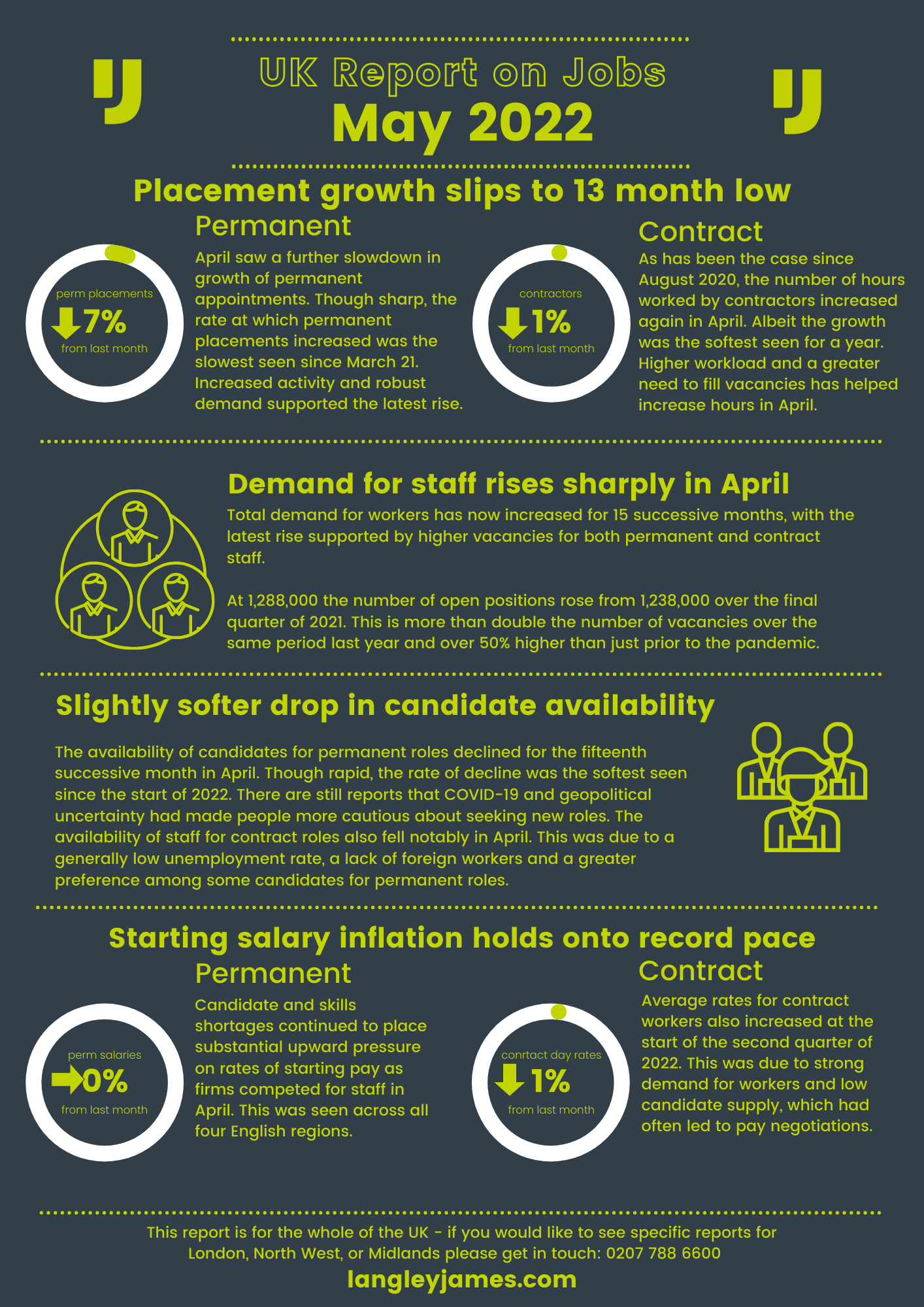

Apr 26, 2022 | Hiring Resources, IT, Tips
Onboarding IT staff correctly is one of the foundation building blocks in ensuring success when it comes to hiring. Often an area that is daily overlooked, it’s time that things changed! With the IT staff shortage reaching all areas of IT, businesses are starting to invest more in recruitment and retention. So don’t let your hiring process fall at the final hurdle. Our team share their top tips for onboarding IT staff in 2022.
But first, let’s share 2 key stats so that you can see why this is so important.
Here’s our Top 3 Tips for Onboarding IT Staff
Don’t wait until day 1
We’ve all been there. Working your notice period can be a lonely place to be. Plus, with the market being flooded with jobs as it is at the moment, it’s a vulnerable time for all. If you’ve secured a strong candidate, don’t then lose them for the sake of a few emails or calls. Keeping in touch with your new starter during their notice period is vital. Why not use this time to start to introduce them to their team? An email to make an introduction is enough, but you can take it further too. Arranging a virtual lunch with their teammates over Zoom or Team is a great way to make them feel involved before joining. Failing that, reach out to them on LinkedIn and ask their colleagues to do the same.
At Langley James, we pride ourselves on our exceptional levels of customer service. To both our clients and our candidates. That’s why, if you recruit with us, we will be in touch with your new hire each week during their notice period. This helps to alleviate any fears, answer any questions and to generally support them through their notice.
The art of storytelling when onboarding IT staff
It’s another hot topic in the employment market – employees like to join companies with shared values. And whilst their values will have felt aligned during the interview process, it’s important to share the story again when onboarding IT staff. You want your new hire to be professionally invested in your company. You want them to feel a sense of belonging and a sense of achievement. What purpose do you have as a company? Keep this at the forefront when designing your onboarding process. What exciting projects have you already been involved in, or, what do you have in the pipeline. Engaging your new hires with captivating stories about your company will make their first week an exciting one.

Set them up for success
Thinking that spending 10 minutes with your new hire on forms and formalities is enough is a mistake. It always takes time for a new hire to settle in. However, this has, in some cases, been further exacerbated by hybrid working. it can take longer for them to get into the team culture, establish a routine and understand new processes. Your role is to make their first few weeks as easy as possible. With lots of people spending so much time alone over the last couple of years, some may not have the confidence they used to. Make sure that they know where to turn if they have a problem. Let them know about lunch arrangements and even arrange for them to have a lunch buddy for the first week. Whilst this may not be necessary for more senior hires, it will certainly make a difference for more junior and mid-level roles.
About Langley James
We live and breathe everything IT. We know that market and know what it takes to attract the very best IT talent. Why not work with us on your next IT vacancy and experience the difference of working with a specialist who really does know the market. Get in touch with our expert recruiters today and let’s help you to recruit someone worth recruiting.

Apr 13, 2022 | IT, IT Market Reviews
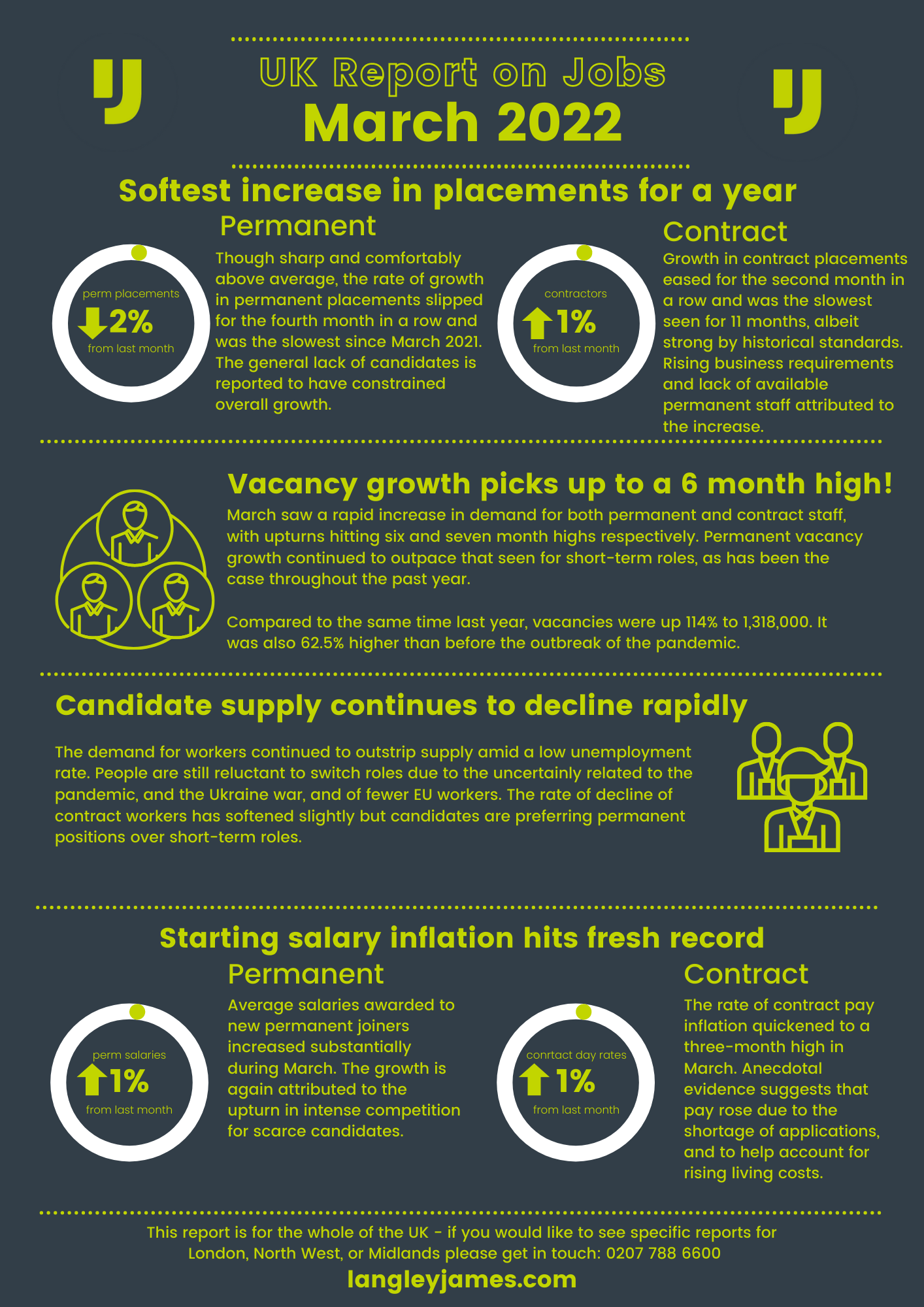

Apr 3, 2022 | Hiring Resources, Tips
To attract IT talent is becoming harder. With current vacancies in the UK at record levels – 62.5% higher than pre-pandemic – the power is firmly in the hands of the candidates. Coupled with a general supply of candidates, it’s the perfect storm! However, there is some great IT talent out there, it’s just a case of attracting them to your role.
Our team share their top tips to help you to attract IT talent in 2022.
What’s your elevator pitch to attract IT talent?
People are no longer looking for a job. They are looking for a sense of purpose and something that resonates with their own personal values. Therefore, simply writing a job spec that’s a list of requirements simply won’t cut it in today’s jobs market. It’s a medically proven fact that our happiness depends on many things in life, but one in particular is alignment. What we do has to align with our values to make us truly happy in our work. Now, you don’t have to be saving the world, one mouse click at a time! But what values does your company represent? It’s critical to understand what your ‘target market’ are looking for and what appeals to them. With candidates still feeling some trepidation when it comes to moving jobs, you need to give them a reason to move.
Know your market
Are you going to market with the same job, same salary, same location as you were 2 years ago? Times have changed and if you haven’t kept up, then it’s likely you’ll be disappointed when it comes to hiring. Unless you are really able to offer something truly attractive; like the latest technology, flexible working, career development etc. it’s unlikely that you’ll attract IT talent at the level you need to. So, unless your IT role isn’t urgent, we strongly advice that you research the market, or ask an experienced recruiter for their insight. We understand that it’s not always possible to simply offer a higher salary. Although, you always need to know how far off the mark you are. So instead, you may have to drop some of the requirements from the essential list. Speak to our team today to get all the insight you need.

Is your recruitment process right to attract IT talent?
A drawn-out recruitment process is a problem. It’s as simple as that! In a market that is saturated with jobs, time is of the essence if you want to attract the best. There’s a popular phrase in the sales world – ‘time kills all deals’ and the same is true when it comes to recruitment. If your process is longer than 2 weeks, then it’s too long! Candidates will go elsewhere, and it will take you a lot longer to complete the process – sometimes over 3 months! So take a look at your process and decide if it’s still fit for purpose. Work with a recruiter that can work within your timescales, and you’ll soon have that IT role filled.
How we can help
We live and breathe everything IT. We know that market and know what it takes to attract the very best IT talent. Why not work with us on your next IT vacancy and experience the difference of working with a specialist who really does know the market. Get in touch with our expert recruiters today and let’s help you to recruit someone worth recruiting.

Mar 23, 2022 | HR
It’s almost April, and the time for some key changes to Employment Law. Our team have put together the top 4 things you need to know to help ensure your company stays on top of the new rules.
4 Key Employment Law Changes
Increase in Minimum Wage – 1st April
Whilst April brings new minimum wage increases, there are also rises in other statutory rates. There is a focus on improving family friendly leave rates. Maternity, paternity, adoption and parental bereavement leave are all changing. These rates will increase from £152.97 to £156.66 per week.
Sick pay is all rising from £96.35 to £99.35 per week.
National minimum wage rates will be –
- National Living Wage – £9.50
- 21-22 Year Old Rate – £9.18
- 18 – 20 Year Old Rate – £6.83
- 16 – 17 Year Old Rate – £4.81
- Apprentice Rate – £4.81
Gender Pay Gap Reporting
The deadline for publishing your gender pay gap report is imminent! The deadline for private and voluntary sector employers is 4th April 2022. This report will need to be on your website and on the gender pay gap reporting portal on gov.uk
But you don’t just have to provide the figures. The gender pay gap report also give you the opportunity to provide any details around the gender pay gaps, if you have any. You can provide and explanation and can even include what measures you are taking to reduce the gap. As documents such as this are likely to form part of the decision-making process when hiring, it’s important that it shows you in a good light. Whilst candidates will appreciate that gaps do exist, if you are making proactive steps to reduce this, that could help attract a more diverse workforce.

IR35 ‘Grace Period’
IR35 came into force in April 2021. However, HMRC has taken a light touch to any enforcement notices in what is being called a ‘grace period’. The important thing to know is that this comes to an end on 6th April. Under the new rules, it is the responsibility of the organisation employing the contractor to determine their employment status. Therefore, it’s a great time to review your IR35 compliance and get your status determinations updated if necessary.
If you employ contractors and need help to secure the very best IT talent, we can help. We have a fantastic pool of contractors ready for work. Get in touch with our team to find out what we could do for you.
Employment Law Changes to Flexible Working
Just 2 years ago the way we worked changed practically overnight. Most companies required staff to work from home full time. But as we return to normal and the return to the office now fully underway, it’s important to know the changes to flexible working. Although, it’s important to note that there isn’t yet a fixed date for this to happen.
The current government guidance is to ‘work from where you can’. And in a view to modernise the day we work; they have proposed a change that will impact every company. The proposed plan is to make it possible for employees to request a flexible work pattern from day one. There’s also discussion around the number of requests and employee can make, and the time you should take to respond.
About Langley James
Established in 1999 we connect the right people to the right opportunities across all types and sizes of organisations throughout the UK. Our extensive Network of IT Professionals puts us ahead of the competition. Next time you’re recruiting into your IT team, whether contract or permanent, we’d love the opportunity to help you to recruit someone worth recruiting.





































































































Recent Comments